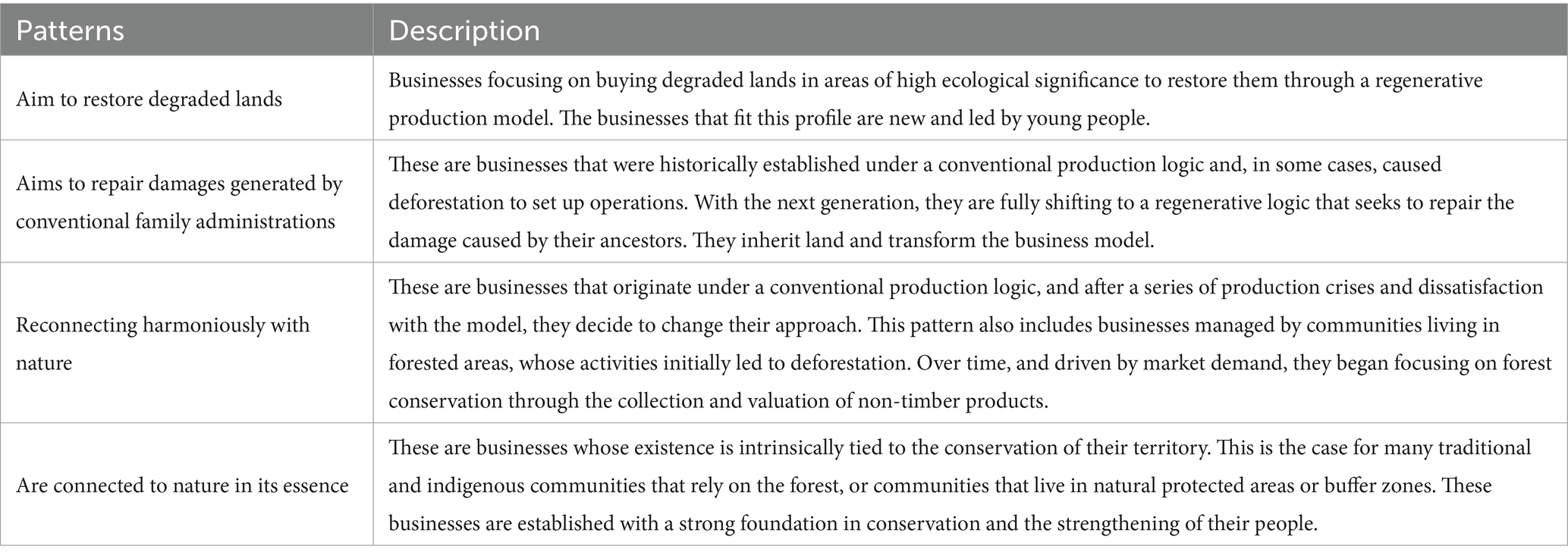- 1Department of Agrobiodiversity and Food Security, Tropical Agricultural Research and Higher Education Center (CATIE), Turrialba, Costa Rica
- 2Sustainable Business and Finance Direction, Fundación Avina, Córdoba, Argentina
Food systems account for approximately 34% of global greenhouse gas emissions. This figure in itself stresses the urgent need for effective solutions that mitigate impacts while ensuring food security. Regenerative Agriculture and Regenerative Food Businesses are emerging as promising approaches to address this challenge. However, it is essential to develop accessible methods to gather and standardize information on regenerative framework to gain stakeholder support and encourage business adoption. This article presents the Initial Perception of the Regenerative Approach (IPRA) tool, designed to provide a rapid and preliminary assessment of the alignment of food businesses in Latin America and the Caribbean (LAC) with the regenerative approach. IPRA evaluates whether a company’s actions, intentions, and narrative are aligned of regenerative principles and practices. Its goal is to generate sufficient data, at low cost, to enable different institutions to analyze and identify business models that align with their interests, prior to investing in more in-depth field studies. The tool comprises four main instruments that support the systematic collection of business information and the evaluation of regenerative attributes across environmental, social, and economic dimensions. A scoring system (0–4) is used, integrated with qualitative data from interviews. The IPRA was employed in the analysis of 55 food businesses drawn from a previous mapping of 181 businesses across the Amazon and Central American Dry Corridor. The results showed that the tool is capable of providing a general overview of the regenerative approach adopted by businesses, as well as enabling comparisons among them. It also serves as a useful resource for stakeholders seeking a deeper understanding of businesses they might be interests in. These findings revealed varying levels of alignment among the businesses, with an overall correspondence with regenerative practices highlighted in existing literature, particularly in agronomic and environmental aspects. The tool proved adaptable, effective, and cost-efficient for gathering data across the food system, including agricultural production, forest food gathering, or commercial processing. This rapid overview offered by the IPRA could play a key role in supporting the urgent development of public policy frameworks and other actions aimed at strengthening and advancing the regenerative approach throughout LAC.
1 Introduction
The consequences of the climate change crisis affect not only the state and resilience of natural resources but also the socio-cultural and economic conditions of the world population (IPCC, 2023). This ‘state of crisis’ is tied to a complex web of causes and effects in which ecosystem degradation impacts people’s livelihoods, while at the same time socioeconomic vulnerability might exert additional pressure upon the natural resources available in each region (Hirvilammi and Koch, 2020; Gabric, 2023; Prochazka et al., 2023). Food system activities are significant contributors to the climate crisis and among the most vulnerable to its impacts (Fróna et al., 2021). Approximately 34% of global greenhouse gas emissions stem from food systems, while agricultural activities and related land-use changes account for roughly 71% of these emissions (Mbow et al., 2019; Crippa et al., 2021). Mitigation and adaptation efforts are increasingly critical to minimizing these impacts across the entire food system (Clark et al., 2020) and, while most research on mitigation has traditionally focused on agriculture, there are substantial opportunities for interventions in all stages of the value chain (El Bilali et al., 2019; Niles et al., 2018; Webb et al., 2020). In the pursuit of food system transformation, the regenerative approach has emerged as a promising framework for fostering environmental positive change and addressing the climate crisis (Lal, 2020; Loring, 2022; Schulte et al., 2022; Montgomery et al., 2022; Nabuurs et al., 2023; Jayasinghe et al., 2023; Khangura et al., 2023).
Although the regenerative approach is primarily associated with agriculture, it is nonetheless increasingly being integrated into several segments of food systems (Buckton et al., 2023), aiming at fostering socio-ecological systems that generate positive impact beyond primary production (Newton et al., 2020; Elrick et al., 2022; Gordon et al., 2023). This integration seeks to influence different structures along food value chains, such as business models or economic and governance frameworks and other perspectives relevant to food systems (Buckton et al., 2023; Duncan et al., 2020). The regenerative approach proposes moving beyond sustainability or neutrality, and targets instead to generate a net positive impact for the planet (Seymour and Connelly, 2023). Many practices related to this approach have increasingly shown positive evidence of biodiversity conservation, climate change mitigation, and potential socio-economic benefits (Huang et al., 2018; LaCanne and Lundgren, 2018; White, 2020; Khangura et al., 2023).
However, gathering and standardizing sufficient, clear information, especially socio-economic data, is still a major challenge to be overcome in order to convince businesses to adopt the regenerative approach and gain stakeholder support (Schreefel et al., 2020; Jayasinghe et al., 2023). Furthermore adapting this approach to the socio-cultural contexts of Latin America and other regions is vital (Vargas et al., 2022; Schulte et al., 2022; Sands et al., 2023) along with the development of tools and a shared understanding that enable researchers, practitioners, businesses, investors, and other impact-oriented entities to apply it consistently (Newton et al., 2020; Schreefel et al., 2020; Jayasinghe et al., 2023). This also involves addressing the risk of greenwashing and ensuring that businesses do not use regenerative terminology superficially without genuine action (Tittonell et al., 2022; Gordon et al., 2023; Boucher et al., 2023).
Looking to strengthen the methodological framework for analyzing and applying the regenerative approach in food systems in Latin America and the Caribbean, and to encourage concrete actions supporting business models aligned with this approach, we have created the Initial Perception of Regenerative Approach tool (IPRA). This tool was designed to provide a rapid and preliminary assessment of the level of alignment by food businesses of the regenerative approach guidelines. The IPRA tool evaluates whether a company’s actions, intentions, and narrative are aligned with regenerative principles and practices.
While the importance of assessing a business’s socio-ecological impact is widely recognized, it is also imperative to acknowledge that such evaluations can be both costly and time-intensive (Newton et al., 2020). IPRA tool’s aim is to generate sufficient, cost-effective data that will enable academic institutions, governmental and non-governmental organizations, investors, and other key stakeholders to analyze and identify business models aligned with regenerative approach in any crop or ecosystem. Prior to investing in more costly and resource-intensive field studies. Tools like IPRA, which facilitate an ex-ante assessment of food businesses, are key to supporting early-stage decision-making processes and guiding the strategic allocation of resources for subsequent field-based studies.
This article introduces and details the methodology employed for the application of IPRA. It further presents the main findings derived from its implementation across 55 food businesses located in the Amazon and the Central American Dry Corridor. The results, organized according to environmental, social, and economic dimensions, demonstrate the tool’s potential to analyze the regenerative approach. Simultaneously, the findings provide insights into the broader context and characteristics of food businesses alignment of such approach within the territories where the tool was applied.
2 Materials and methods
2.1 IPRA background
The IPRA tool was designed and applied following a previous mapping1 process where food businesses with a potential regenerative approach were identified in the Amazon biome and the Central American Dry Corridor (CADC). From this mapping effort, a total of 181 food businesses were identified across 11 countries (Amazon: Brazil, Peru, Ecuador, Colombia, Bolivia; CADC: Panama, Costa Rica, Nicaragua, Honduras, El Salvador, and Guatemala). Such survey was accomplished through a systematic review of secondary information, such as documents, websites, social media and other resources available online. In addition, businesses recommended by key stakeholders involved in initiatives related to the regenerative approach or similar frameworks were also mapped.
Two main considerations guided this process: First, the term “Regenerative Food Businesses” was chosen over “Regenerative Agribusinesses” to encompass non-timber forest products and other non-agricultural food production activities (e.g., food system-linked businesses) as well as to avoid association with large-scale degenerative agriculture, a common interpretation in Brazil. Second, the process aimed at including social justice considerations, such as gender inclusivity and valuing local and traditional knowledge, so as to support a regenerative approach committed to transforming food systems in the Global South.
The IPRA tool is grounded in the definitions and attributes (principles, practices, and outcomes) of Regenerative Food Businesses (RFB) and Regenerative Agriculture (RA) agreed upon by the Regenerative Food Business Consortium2 (RFB Consortium). These key regenerative attributes were identified and collaboratively examined through a review of scientific articles, institutional technical documents, and online articles from major corporations using these terms, and further discussed in eight virtual workshops with the 10 member organizations of the RFB Consortium. The IPRA tool was then designed and applied to closely analyze and evaluate a set of regenerative attributes and characteristics of some of these previously mapped businesses.
The definitions agreed upon by the RFB Consortium, available in the NAR (2023), are as follows.
Regenerative Food Businesses (RFB)
“They are initiatives that prioritize the centrality of nature within the business approach to food production. In RFB, the conservation, restoration, and strengthening of ecosystems are central to the activities, purposes, and value proposition of the business. At the same time, they are aligned with an integral and holistic approach, aiming to ensure that equity, sociocultural justice, and economic prosperity are distributed throughout the supply chain/network and processes to which they are connected.”
Regenerative Agriculture (RA)
“It is a holistic management approach that, by prioritizing the centrality of nature, restores the health of living systems such as soil, biodiversity, water, and animal welfare, mimicking ecological processes to create more resilient productive systems. At the same time, it is a model that enhances equity, sociocultural justice, and economic prosperity within the productive context and integrates different forms of knowledge, from ancestral to scientific-technological.”
2.2 Tool structure and use
The IPRA tool analyzes 18 regeneration related attributes and their respective variables, as outlined in Table 1: 9 attributes in the environmental dimension (4 of which apply exclusively to agricultural production, when applicable), 7 attributes in the social dimension, and 2 in the economic dimension. A comprehensive explanation of the RFB Consortium’s interpretation of these evaluated attributes can be found in RFB-HUB.3
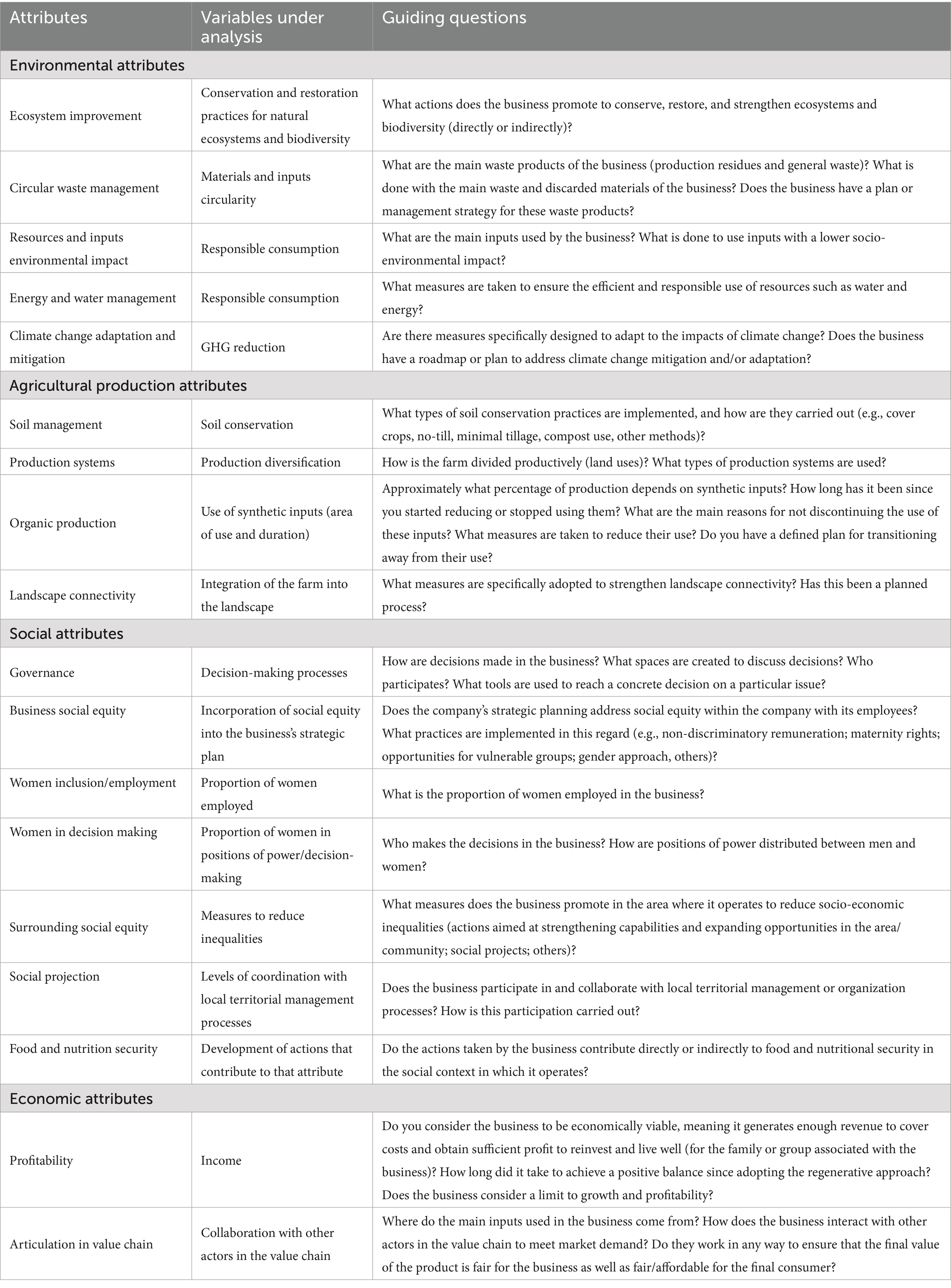
Table 1. Attributes, variables under analysis and guiding questions used by the Initial Perception of Regenerative Approach Tool.
The tool is designed to be implemented by students or professionals affiliated with academic institutions, governmental or non-governmental organizations, investment entities, cooperatives, or other interested institutions seeking to investigate the alignment and progress related to regenerative principles, practices or outcomes of the regenerative approach in food businesses. The RFB Consortium applied this tool with the objective of assessing the alignment of the regenerative approach within business contexts and identifying cases of particular interest for subsequent in-depth field analysis.
However, other organizations may choose to apply the tool to analyze the current state of a business or its progress, according to their specific analytical interests, such as ecosystem types, product categories, value chains or networks, or within a cooperative setting to assess and strengthen businesses, among other aims. The tool is intended for applied on businesses that operate at either the farm level or within broader bioregional systems.
Its effective application should preferably be carried out by individuals who are familiar with the regenerative approach or similar frameworks, and who are capable of conducting dynamic interviews and critically analyzing the results. This individual is responsible for completing the IPRA instruments and facilitating the discussion of findings with the entities requesting the study.
To operationalize the analysis of business attributes and characteristics, the IPRA is comprised of four complementary instruments:
1) Secondary information matrix: This matrix is used as the first step before interviews to provide an initial overview of the business, based on information available online and public documents. This instrument was used to organize the information collected during the broader business mapping process described earlier in this section.
2) Interview protocol: This protocol is meant to be a guide during interviews with business representatives aimed at collecting primary information on characteristics related to regenerative attributes and the business’s general context.
3) Attributes evaluation reference table: This table serves as a reference for interpreting some of the information collected during the business interviews. More specifically, it is used to evaluate in a scale from “0” to “4” the alignment of regenerative attributes within the businesses.
4) Interview systematization matrix: This matrix organizes key information from the interviews to evaluate attributes and analyze various aspects of the business narrative.
The IPRA instruments are described and implemented as follows:
The Secondary Information Matrix (Supplementary material 1) is structured as an Excel template to organize basic business information that is usually accessible from secondary sources, such as websites, social media, public reports, and other sources. This step gathers elementary details, including the name of the business or initiative, contact information, location, and year of establishment, as well as more specific data when available, such as product types, production systems, involvement of indigenous peoples, gender approach, and certifications. This compilation provides an overview of the business’s context and approach and can help select the cases to be taken forward for interviews.
After the initial identification of businesses during the mapping process, invitations for interviews to apply the IPRA were sent out. First, invitations were extended to businesses that self-identified as regenerative, as well as to prominent cases that exhibited, through secondary information, a strong alignment with regenerative practices, even if they did not explicitly use the term “regenerative.” Once invitations to these primary cases had been sent and efforts to secure their participation had been exhausted, invitations were then extended to the remaining businesses identified in the mapping process.
A series of 55 semi-structured virtual interviews, normally scheduled for 90 min, were then conducted with representatives from several mapped initiatives, guided by the IPRA Interview Protocol (Supplementary material 2). These interviews, structured with approximately 72 questions, aimed to gather both qualitative and quantitative data on business practices and contexts related to the regeneration attributes. They provided more detailed insights beyond the information initially collected in the Secondary Information Matrix and other sources, so that the experiences of the businesses could be organized, systematized, and consistently analyzed. Whenever possible, the interviews were conducted by two interviewers to allow for cross-interpretation and assessment of the business during the subsequent steps of the process. For the same reason, transcriptions and recordings of the interviews were preserved to enable deeper analysis and allow individuals who were not present during the interviews to contribute to the process, if necessary.
As a support instrument, the IPRA Attributes Evaluation Reference Table (Supplementary material 3) offers a set of descriptive options to facilitate the interpretation of information from the interview and assess how businesses performed in each attribute. These descriptions are designed to reflect a gradient of alignment with a regenerative ‘optimum’ for each attribute. Each business may receive one of five scores for each attribute, ranging from 0 (representing a non-regenerative approach) to 4 (indicating a strong regenerative approach). The scoring descriptions are intended to be straightforward enough to minimize subjectivity among evaluators, while also being flexible enough to accommodate the diversity of business types and contexts. Therefore, some attributes were not applicable in certain cases; for instance, businesses focused solely on non-timber forest business, transformation, or trade may not be scored on attributes related to agricultural production.
Subsequently, with the support of the Attributes Evaluation Reference Table, the data from each business interview was then interpreted and organized using the IPRA Interview Systematization Matrix (Supplementary material 4), structured as an Excel template. This matrix, consisting of a total of 61 information cells, is divided into five sections: a general business information section (30 cells), an environmental dimension section (10 cells), an agricultural practices section (11 cells), a social dimension section (12 cells), and an economic dimension section (6 questions). While some of this information was processed in an extended descriptive format, most of it was ordered using pre-established multiple choice options to facilitate analysis (e.g., various soil conservation practices that could be adopted). In this Matrix, the ‘0’ to ‘4’ scoring scale is not applied to the General Business Information Section.
The General Information Section of the Interview Systematization Matrix was designed to record descriptive characteristics of business, such as its origin, history, views and values, purposes, and goals, and it was crucial for providing narrative context that complement the analysis of each business. This contextual understanding supports a more comprehensive analysis when combined with the other scored attributes.
The analysis of results laid out in the Interview Systematization Matrix relies on descriptive statistics and narrative analysis (Kaplan, 2017), where the responses and their underlying intentions offer insights into the purpose of the business. Each business was examined on multiple levels: each attribute was analyzed separately, then averaged within their corresponding dimensions, and finally, all attributes and dimensions were observed together using ‘spider web graphs’. This approach, combined with the narrative context, provided a broader perspective on the business’s regenerative alignment. Lastly, alignment patterns and trends in attributes and their respective dimensions were analyzed across different businesses.
3 Results and discussion
The outcomes presented demonstrate the type of information that can be generated through the application of the IPRA, as well as its potential to provide useful insights for decision-makers. In addition to offering data on the individual alignment with regenerative standards by businesses assessed by the RFB Consortium, the tool also enables a broader overview of the key attributes related to the regenerative approach, which is presented in this section.
As we have pointed out earlier, IPRA was applied on 55 of 181 previously mapped businesses that explicitly use the word “regenerative,” as well as businesses that may not openly use such word but whose practices and principles align with the approach, based on RFB Consortium’s understanding of what constitutes a regenerative approach. Its application made it possible to broadly analyze and understand the alignment of the different dimensions of the businesses. It also allowed for a deeper understanding of their essence by delving into their objectives, purposes, practices, and dynamics as shared by the interviewees. Figure 1 shows the distribution of these businesses by country and region.
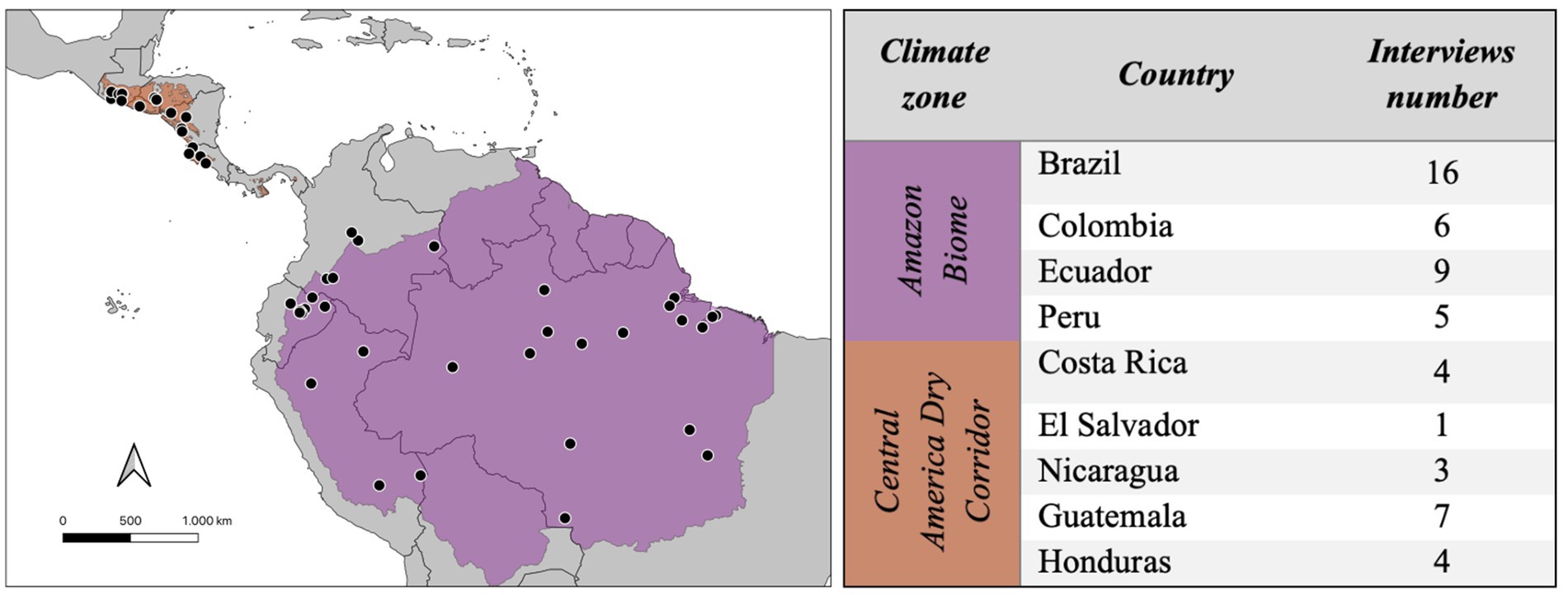
Figure 1. Distribution of the interviews by country and focus climatic zone Central America Dry Corridor and the Amazon Biome. Map elaborated by Bruna Amante.
Of the 55 interviewed, 20 were associations or cooperatives, 17 were micro enterprises, 16 were small and medium enterprises, and two were large enterprises. The types of products (raw or processed) and production systems managed by these businesses are diverse, as shown in Table 2. In Agroforestry Systems (AFS) (including agrosilvopastoral systems), crops are integrated with trees in varied structures. However, trees, which provide ecosystem services beyond food production, are not detailed in table.
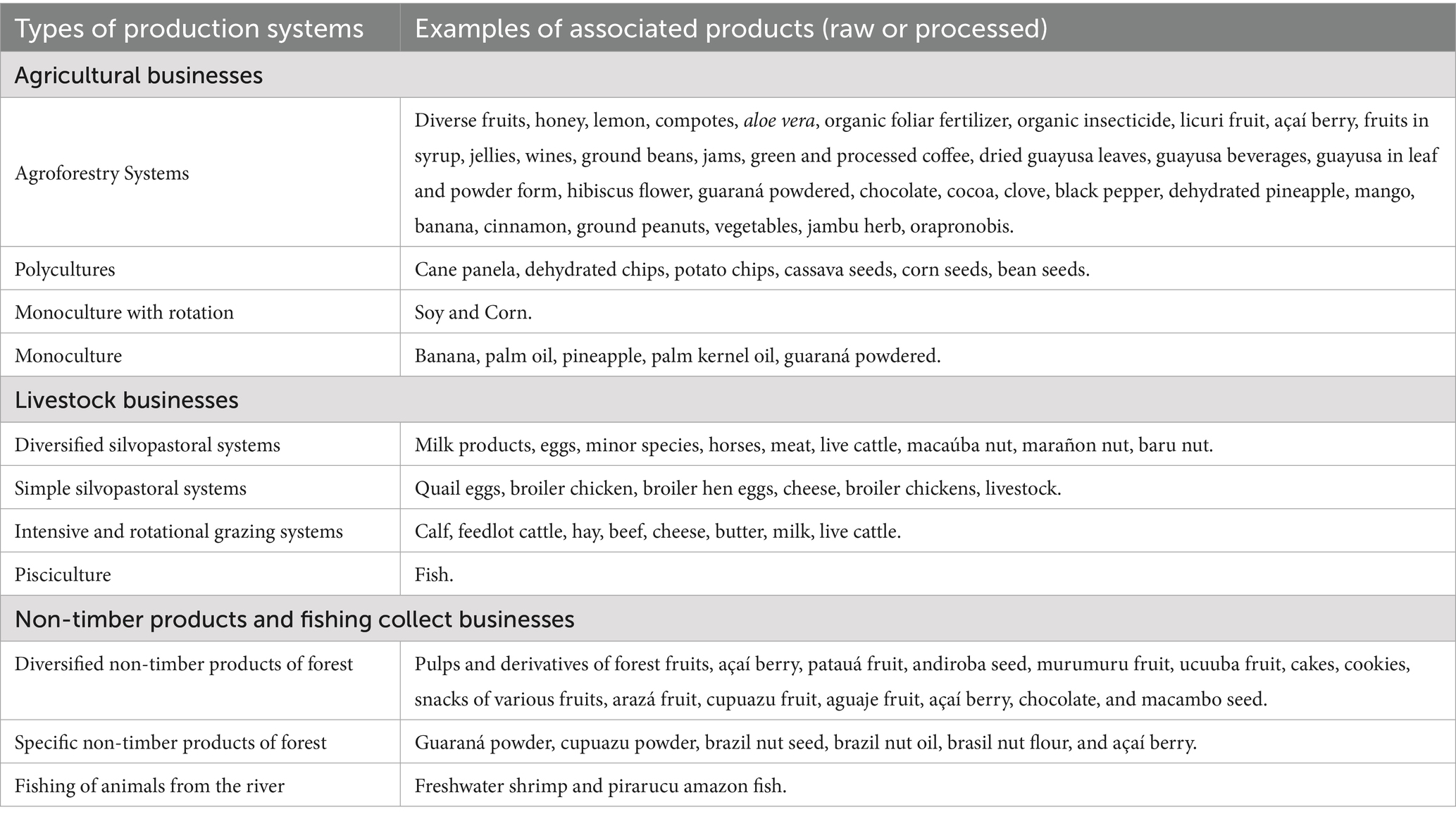
Table 2. Types of production systems and products (raw or processed) handled by businesses interviewed.
The scope of influence of surveyed businesses ranged from farm level (13) to local/community level (16), and up to territory/landscape level (26). Although businesses operating at territorial/landscape level were indeed predominant amongst those interviewed, one has to bear in mind that this is largely due to the involvement of cooperatives and associations that encompass multiple small producers, rather than the presence of large estates. On the other hand, according to Tittonell et al. (2020), the ecological approach to food production is predominantly practiced on a small scale due to the lack of technologies, and other components necessary for large-scale production. This presents a challenge when it comes to integrating businesses with large land holdings into a regenerative transition.
The average results of the IPRA application (Figure 2) provide an overview of the actions taken by all types of businesses analyzed. The results indicate a positive balance in most of the environmental, social, and economic attributes assessed across the businesses. Please review the meaning of the scores assigned to each attribute in Supplementary material 3.
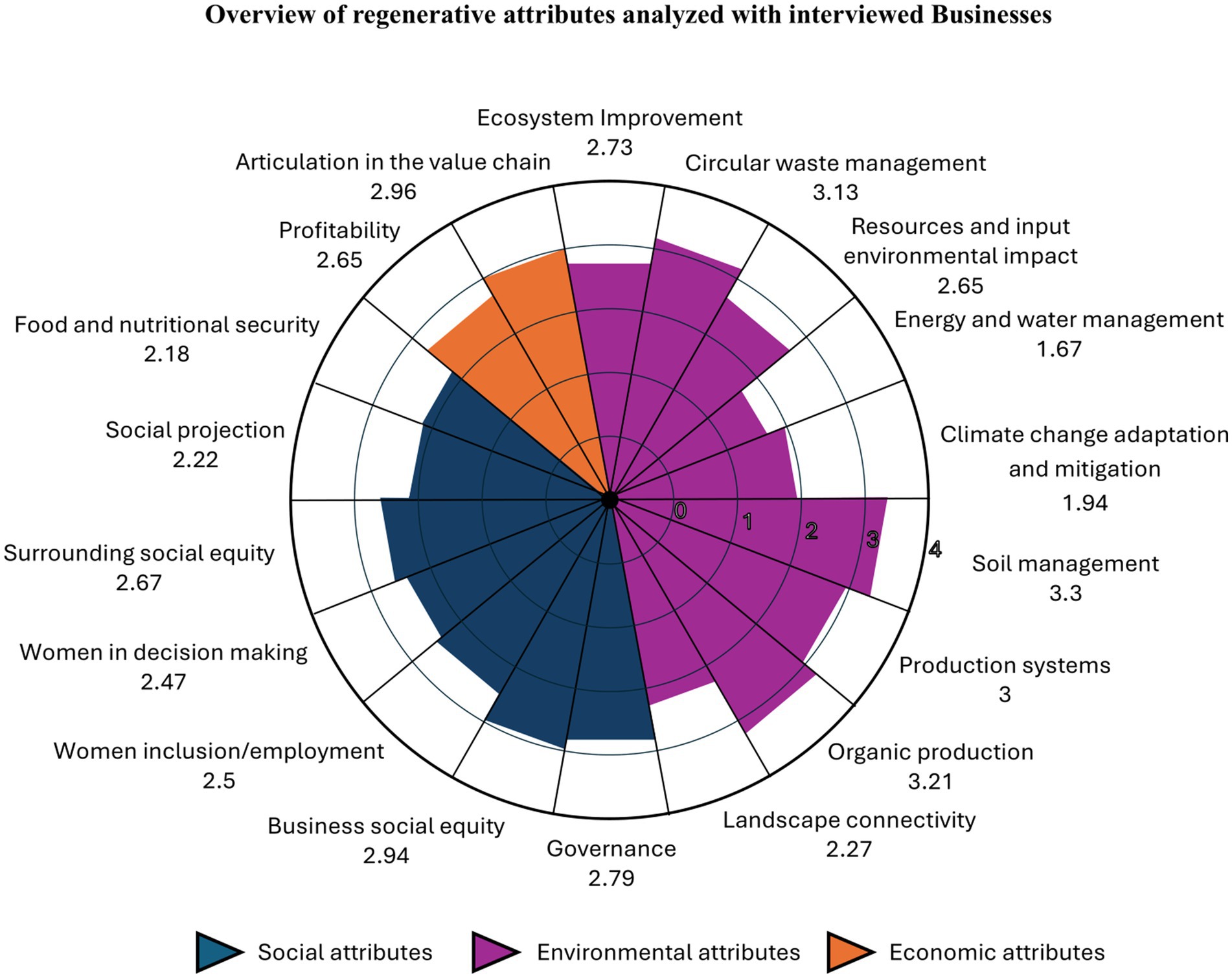
Figure 2. Overview of the development of regenerative attributes analyzed with interviewed Businesses. In dark blue are the attributes associated with the Social dimension. In purple, the attributes linked to the Environmental dimension. Finally, in yellow, the attributes related to the Economic dimension of the businesses.
Figure 2 provides a glimpse into the development of key regenerative attributes across different businesses in the studied areas. The data offers an interesting starting point toward understanding the general alignment of these attributes. However, a thorough comprehension of the depth and quality of some practices can only be achieved through a closer examination of each business, may be by way of field visits. The study reveals that the most developed attributes are ‘soil management’, with an average 3.3 points score, and ‘organic production’, with 3.21 points. These two attributes are primarily associated with agricultural production, though some non-timber forest businesses are also included. Healthy soil and the absence of synthetic inputs in food production are highly relevant attributes, as noted by Newton et al. (2020). For many authors, the core of the regenerative approach lies in soil health (Schreefel et al., 2020; Gordon et al., 2023; Jayasinghe et al., 2023), making this a crucial condition for promoting regeneration.
In the environmental section, the most consistently applied and highest rated attribute across all cases is ‘circular waste management’, which averaged 3.13 points score. Several authors deem the circular approach, in all its dimensions, essential within the realm of regenerative food production (Velasco-Muñoz et al., 2021; Batlles-delaFuente et al., 2022; Dudensing, 2023). In some cases, Circular Economy or Circular Systems is viewed as comparable to this approach (Morseletto, 2020), though the regenerative framework extends beyond this.
In the social and economic dimensions, the highest average scores, shown in Figure 2, are for ‘business social equity’ (2.94), ‘governance’ (2.79), and ‘articulation in the value chain’ (2.96). From a holistic regenerative perspective, whether applied to agriculture or business, the environmental dimension is often more extensively described by scholars, but the socioeconomic dimension and its associated outcomes are increasingly integrated into the discourse (Newton et al., 2020; Schreefel et al., 2020; Tittonell et al., 2022).
The following sections provide an overview of the studied regenerative dimensions, and highlight the diverse conditions and levels of alignment across the various attributes.
3.1 Transition in land use patterns
As described in Table 3, at least four historical patterns and changes in land use were identified in the surveyed businesses. In some cases, there is a link between the business and the historical deforestation of a particular territory; changes thus occur as new generations replace the degenerative patterns of their predecessors or ancestors. At the same time, some businesses are also transforming the conventional business model toward a regenerative one, as the conventional model has failed to respond coherently to the needs of the people involved, especially in the face of economic or environmental crises.
Five factors and motivations that have driven these businesses to shift their approach over time have been identified: (1) Degradation and climatic conditions that no longer yield results; (2) Awareness of the planet’s critical state, which drives the need to build a new paradigm; (3) Improved yields and benefits from preserving the forest through bioeconomy; (4) Fiscal incentives rewarding those who adopt more sustainable practices; and (5) Growing demand for a new food system paradigm that addresses global food security and sovereignty while helping to reverse the climate crisis. These ‘change drivers’ often align, to varying degrees, with motivations for transitioning to ecological systems, according to Thompson et al. (2024). However, these studies also stress how complex it is to identify which single driver is ultimately the true catalyst for change, as the impact of these factors can vary significantly based on the conditions of each territory.
3.2 The use of the “regenerative” terminology
Among the 55 businesses analyzed, 25 self-identify themselves as “regenerative,” 18 of which began using the term during or after 2014, coinciding with the period when the term’s global usage significantly expanded (Giller et al., 2021). Businesses that consider themselves “regenerative” do so based on the practices they implement and their belief that these practices positively impact ecological systems, and in some cases, social systems as well. Some businesses also mentioned a “holistic” approach that integrates various dimensions; Such respondents were generally familiar with or knowledgeable about the term “regenerative,” at least in its broadest sense. While the narrative of businesses using the term were often linked to the practices they adopt, Newton et al. (2020) and Newman-Beckett (2023) highlight the importance of incorporating not only practices into the “regenerative” purpose of the business, but also the principles and outcomes intended to be achieved through these practices.
3.3 Efforts to integrate a gender approach
Of all businesses that were interviewed, 61% (n = 34) are jointly owned (shared between men and women), and 23% (n = 13) have more than 50% of power positions occupied by women. Among these, 9 have over 90% of these positions held by women. The survey reveals that a gender-focused approach is not an intrinsic or planned feature among the businesses interviewed. Most actions promoted by these businesses are not structurally dedicated to improving gender equality in the social contexts to which they belong. Although they express an interest in highlighting this issue and integrating it into the company’s planning, it remains as a conceptual stage as yet. Five of these businesses are entirely built on a gender-focused approach and on a commitment to eliminate related gaps, while 18 businesses mention gender approach as part of their strategy to reduce social inequality. At the same time, it is important to note that gender approach is seldom explicitly addressed in regenerative literature, yet it must be part of a positive social transformation when applied to businesses with this focus (Konietzko et al., 2023).
3.4 Environmental dimension and its gaps
In the environmental attributes section of the survey, the average scores for each attribute are shown in Figure 3. Above each bar, a pie chart illustrates the distribution of scores from 1 to 4 for each attribute. Of the five attributes analyzed in this dimension, ‘Circular waste management’, ‘Resource and input environmental impact’, and ‘Ecosystem improvement’ stand out, as more than 50% of cases have scored 3 or 4 points. This outcome hints that the practices and concerns associated with these issues are considered central to the businesses.
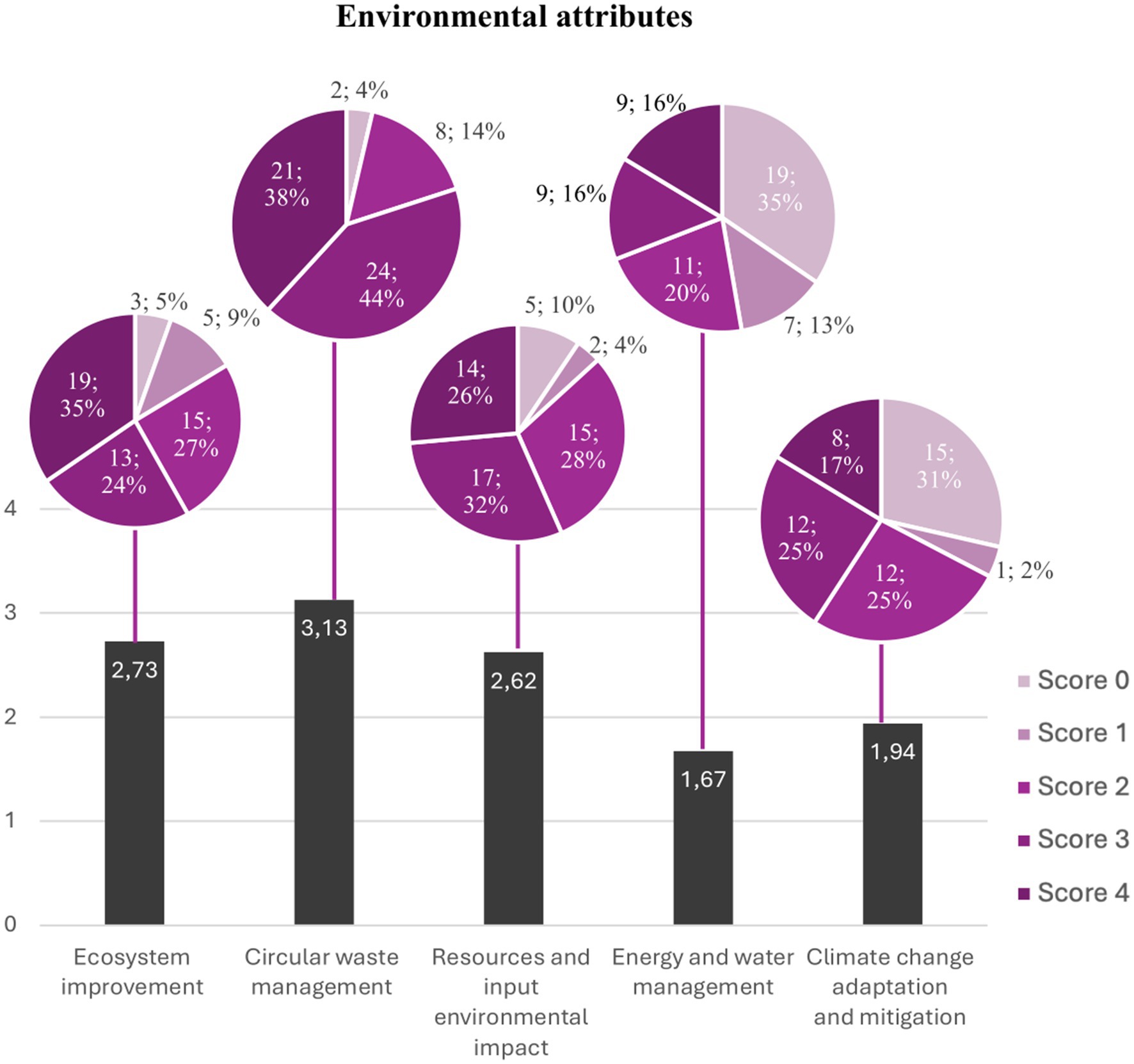
Figure 3. Average scores for each one of the Environmental attributes studied. The bar chart represents the average situation of the evaluated businesses for the assigned attribute. The pie chart represents the number of businesses according to the score they received. The score 0 represents the scenario furthest from the regenerative transition, while 4 represents the ideal regenerative scenario.
‘Circular waste management’s attribute is primarily due to the large volume of organic residues, such as food scraps or pruning waste, produced by the analyzed businesses. These residues are typically recycled within the agricultural system or used for another purpose. However, recyclable and non-recyclable waste, though produced in smaller quantities, is often not adequately managed and is sent to conventional landfills. Of the 25 businesses that self-identify as “regenerative,” 21 have scored 3 or 4 in this attribute.
‘Energy and water management’ and ‘Climate change adaptation and mitigation’ attributes show a large proportion of cases scoring 0 (35 and 31%, respectively). The low average score of 1.94 for ‘Climate change adaptation and mitigation’ reflects the fact that the assessment focused on whether businesses were implementing targeted measures specifically aimed at addressing climate change. While many businesses may understand these concepts and engage in practices that indirectly or directly contribute, only those with deliberate, climate-specific structured actions received the highest scores. As to ‘Ecosystem improvement’s high scores, on may infer that most businesses are actively working to enhance their conservation and restoration practices in a structured, coordinated, and ongoing manner so as to ensure the long-term improvement of ecosystem quality.
Regarding responsible consumption patterns in businesses, as assessed through the ‘Resources and input environmental impact’ and ‘Energy and water management’ attributes, 31 and 18 businesses, respectively, received high scores of 3 and 4. For these attributes, the observed deficiencies are primarily linked to lack of financial capacity to invest in energy efficient technologies, or to acquire environmentally friendly products (such as biodegradable materials, organic products, or locally sourced goods). Access to options may also be limited due to distance or availability in local, regional, or national markets. Furthermore, these deficiencies may be brought about by the fact that these attributes might not always be prioritized by the businesses. Lastly, it is important to note that businesses in the Central American Dry Corridor showed greater concern and progress regarding water use, with practices such as water harvesting and the creation of reservoirs being more commonly reported.
The main conservation practices reported by the interviewed businesses are shown in Figure 4. In addition to promoting good agricultural practices, such as Agroforestry Systems diversification, and soil conservation, many businesses allocate areas for conservation and strengthen restoration practices within their supply chains. While two initiatives reported not engaging in conservation-oriented practices due to limitations in time and resources, they are involved in the collection of forest products and organic production, which could also be seen as active forest conservation practices through their resource use.
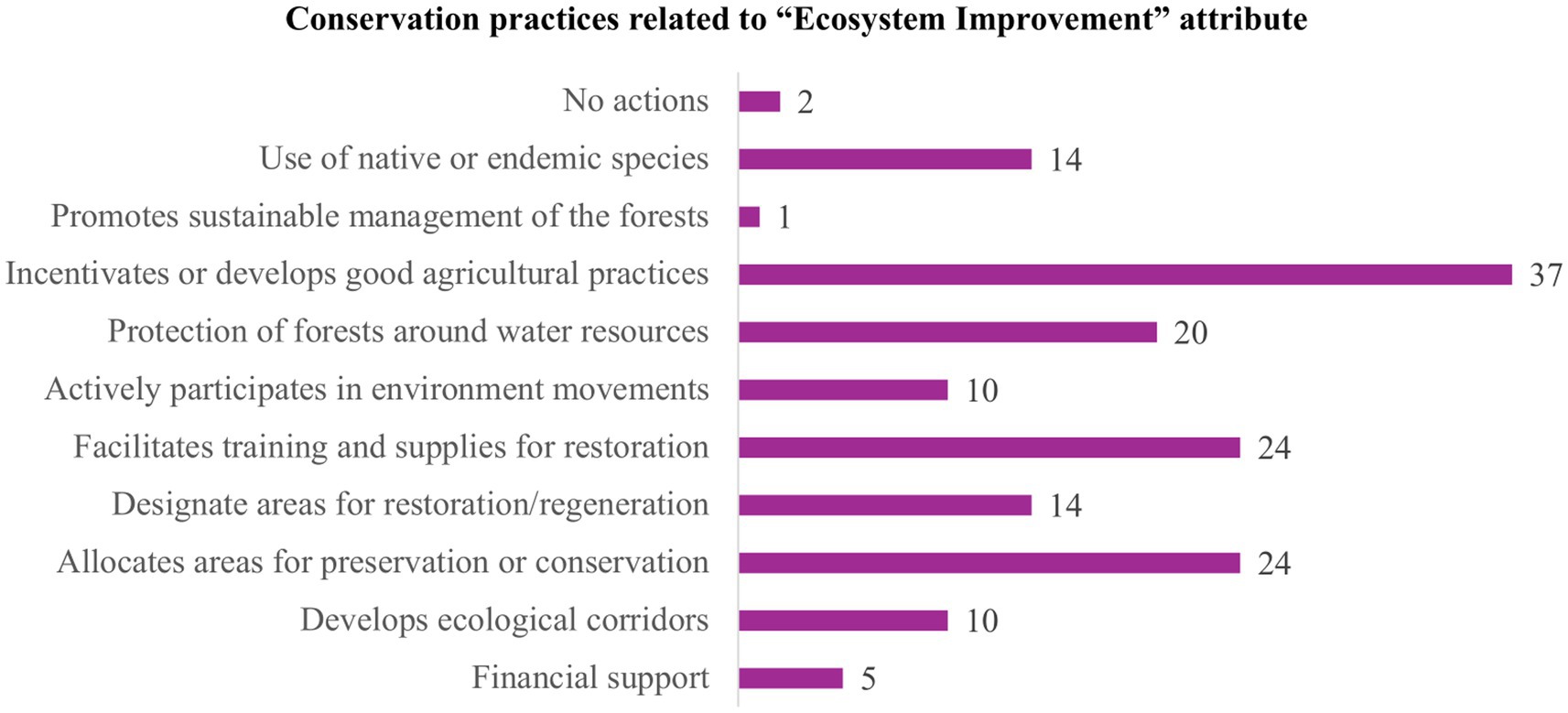
Figure 4. Practices related to the ‘Ecosystem Improvement’ attribute, as identified in the interviewed businesses. The y-axis lists the actions identified to conserve, restore, and improve ecosystems and biodiversity. The x-axis represents the number of businesses that reported engaging in each of these practices.
3.4.1 Agricultural and livestock production
A subset of four environmental attributes was specially analyzed for businesses that are engaged in agricultural production. Figure 5 shows that the attributes ‘Soil management’, ‘Production systems’, and ‘Organic production’ had over 70% of their ratings at scores 3 or 4, demonstrating significant alignment with regenerative production practices. However, ‘Improving landscape connectivity’ was not a primary focus for most businesses.
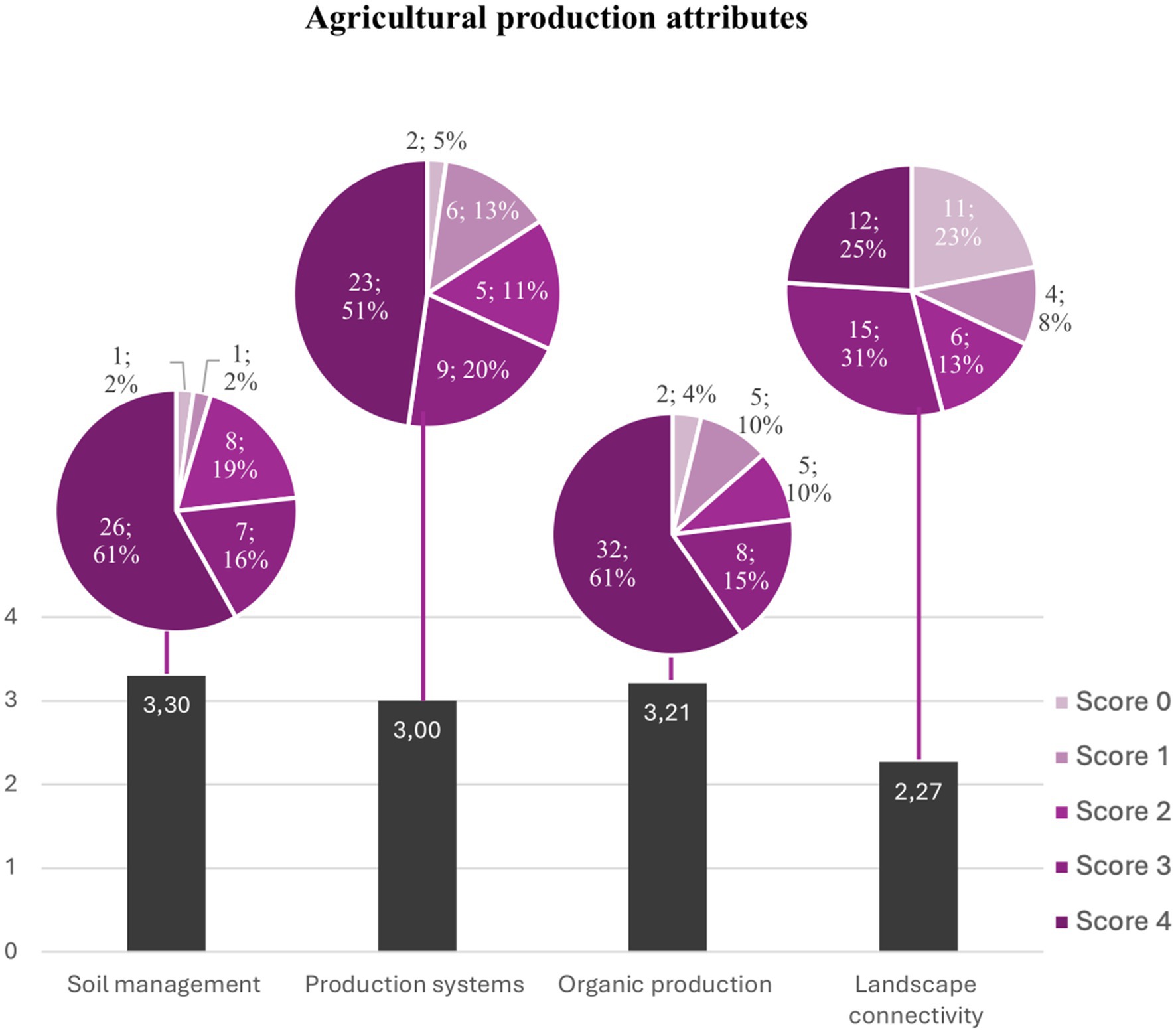
Figure 5. Average scores for each one of the Agricultural production attributes studied. The bar chart represents the average situation of the evaluated businesses for the assigned attribute. The pie chart represents the number of businesses according to the score they received. The score 0 represents the scenario furthest from the regenerative transition, while 4 represents the ideal regenerative scenario.
One of the most important elements of a regenerative approach is the adequate soil management and improvement, along with the use of organic inputs and diversified systems (Rhodes, 2017; Schreefel et al., 2020; Konietzko et al., 2023; Khangura et al., 2023). Figure 6 illustrates the ‘soil management’ attribute practices observed in the study. Thirty-Three of the surveyed businesses have shown an advanced stage of development for this attribute. Common practices include the use of compost and other natural soil fertilization methods, crop diversification, mulching, and cover crops. However, practices such as minimum tillage or no-tillage, which are highly emphasized by scholars and practitioners of the regenerative approach (Newton et al., 2020; Schreefel et al., 2020), were not widespread. Similarly, the use of runoff and erosion prevention methods on slopes, such as barrier plants, contour lines, or ditches, was also less common.
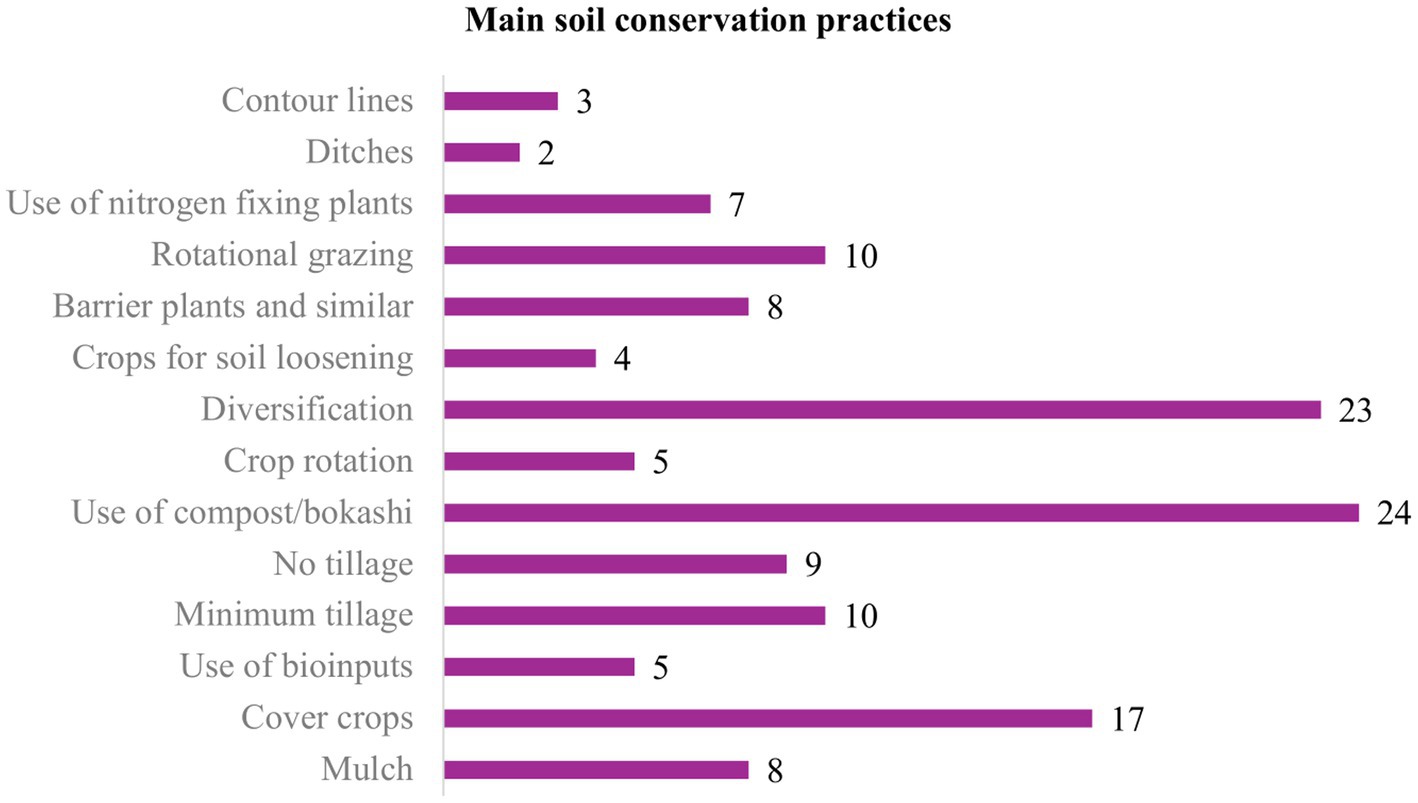
Figure 6. Practices related to the ‘Soil management’ attribute, as identified in the interviewed businesses. The y-axis lists the actions identified to conserve, restore, and improve soil quality. The x-axis represents the number of businesses that reported engaging in each of these practices.
Among the ‘Production systems’ attribute analyzed, biodiverse agroforestry systems were predominant: 37 cases employ this practice. However, in livestock businesses, the integration of trees into silvopastoral systems remains limited. In the cases where the presence of trees was reported, they were often confined to the periphery rather than integrated into grazing areas, and natural fodder banks were largely absent. Among all interviewees 32 cases scored 3 or 4 in the ‘Production systems’ attribute, primarily due to their level of diversification and tree integration within their systems. It is worth noting that some farms without integrated tree systems, or those with less comprehensive tree integration, were managed under the Savory approach. This approach is often recognized as a reference for regenerative livestock practices (Scialabba, 2022), yet it has faced controversies regarding its socio-ecological effectiveness in some contexts (Sherren and Kent, 2019; Gosnell et al., 2020).
The ‘Organic production’ attribute reveals that 68% of the units surveyed do not use synthetic inputs at all, while 24% use them to some extent. Among the 25 businesses that identify themselves as “regenerative,” 13 completely abstain from using synthetic inputs. Notably, some businesses that reported not using synthetic inputs do not hold organic certification. Different practices are employed by those that do use synthetic inputs: some rely heavily on them (over 80% of production) while others make use of them selectively, for example, for targeted fertilization or specific pest control, such as ants. Only two businesses currently using synthetic inputs reported being in transition toward fully organic production.
Most units, however, do have practices designed to minimize synthetic input usage, such as using natural inputs, increasing training, and implementing biological control methods (illustrated in Figure 7). The road to transition to organic production or reducing synthetic input use is plenty of hurdles, such as controlling pests and weeds. For large-scale businesses, the limited availability of biological inputs constitutes an additional barrier, as a very large quantity of compost or other types of biological materials is needed to cover hundreds or thousands of hectares. This challenge is particularly evident in remote locations, such as businesses operating in the Amazon, where, if you do not produce it yourself, you will need a supplier capable of meeting the full demand for biological inputs required for your own core production. If such condition is not met, sourcing from distant regions becomes highly expensive and makes regenerative production model unfeasible.
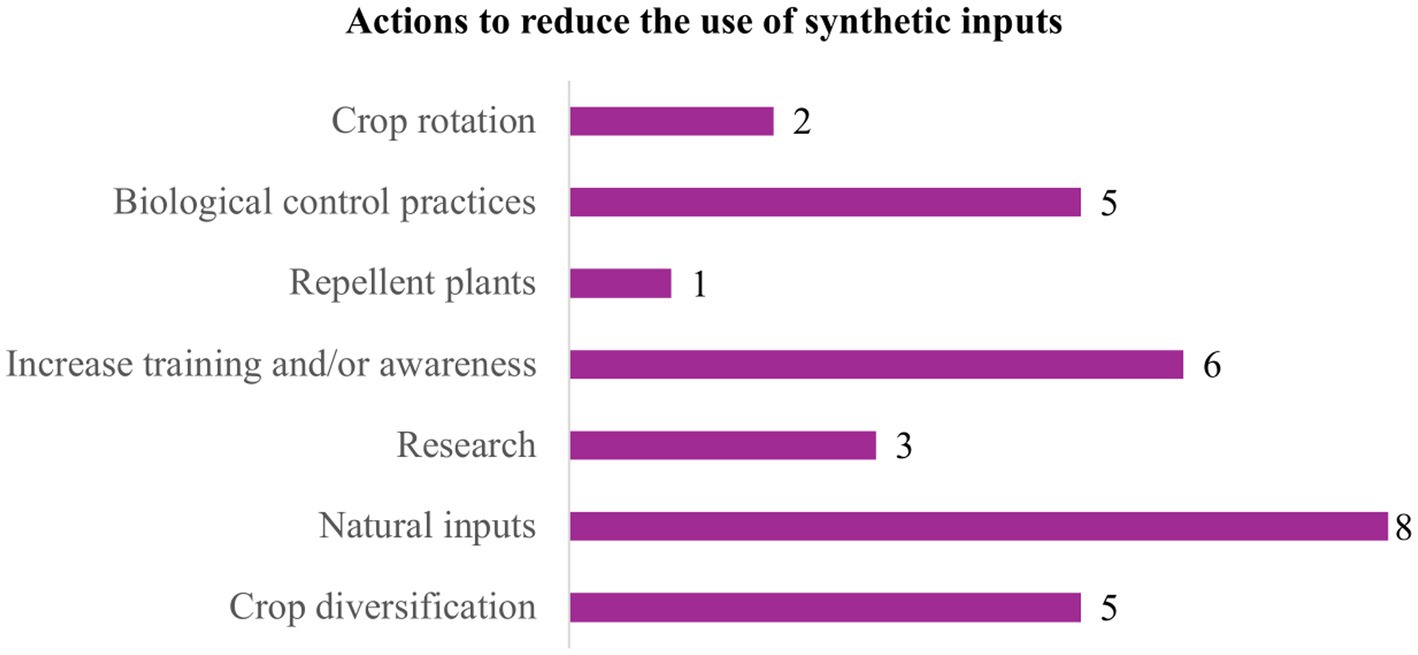
Figure 7. Alternatives to reduce the use of synthetic inputs, related to the ‘Organic production’ attribute, identified in the businesses. The y-axis lists the actions to reduce synthetic inputs. The x-axis represents the number of businesses that reported engaging in each of these practices.
3.5 Sociocultural dimension and its gaps
In four of seven attributes analyzed in the Social dimension, more than 50% of surveyed businesses scored 3 or 4 points. Such scores were registered in the ‘Governance’, ‘Business social equity’, ‘Women’s employment’ and ‘Women in decision-making positions’ attributes. Although the proportion of women in decision making and employment is at least equivalent to that of men, it is worthy bearing in mind that this is not necessarily a direct result of a deliberate policy or incentive within the business. As mentioned earlier, few businesses are structured with a gender perspective.
Notably, the cases that stand out in these four sociocultural attributes, with a total Dimension score above 20, do not use the term “regenerative” and are mainly associations or cooperatives. These business models seek collective welfare and are guided by the search for collective social strength (Billiet et al., 2021). It is also noteworthy that 20 out of the 55 businesses interviewed either integrate indigenous peoples into their supply chain or are managed by indigenous communities. However, if we include the integration and management of other identity-based communities beyond Indigenous groups, the total number of occurrences rises to 32. The level of alignment of the other attributes in the Sociocultural dimension revolves around scores 1, 2 and 3. Figure 8 shows the average scores of the attributes and the proportion of cases scoring each one of the values from 0 to 4.
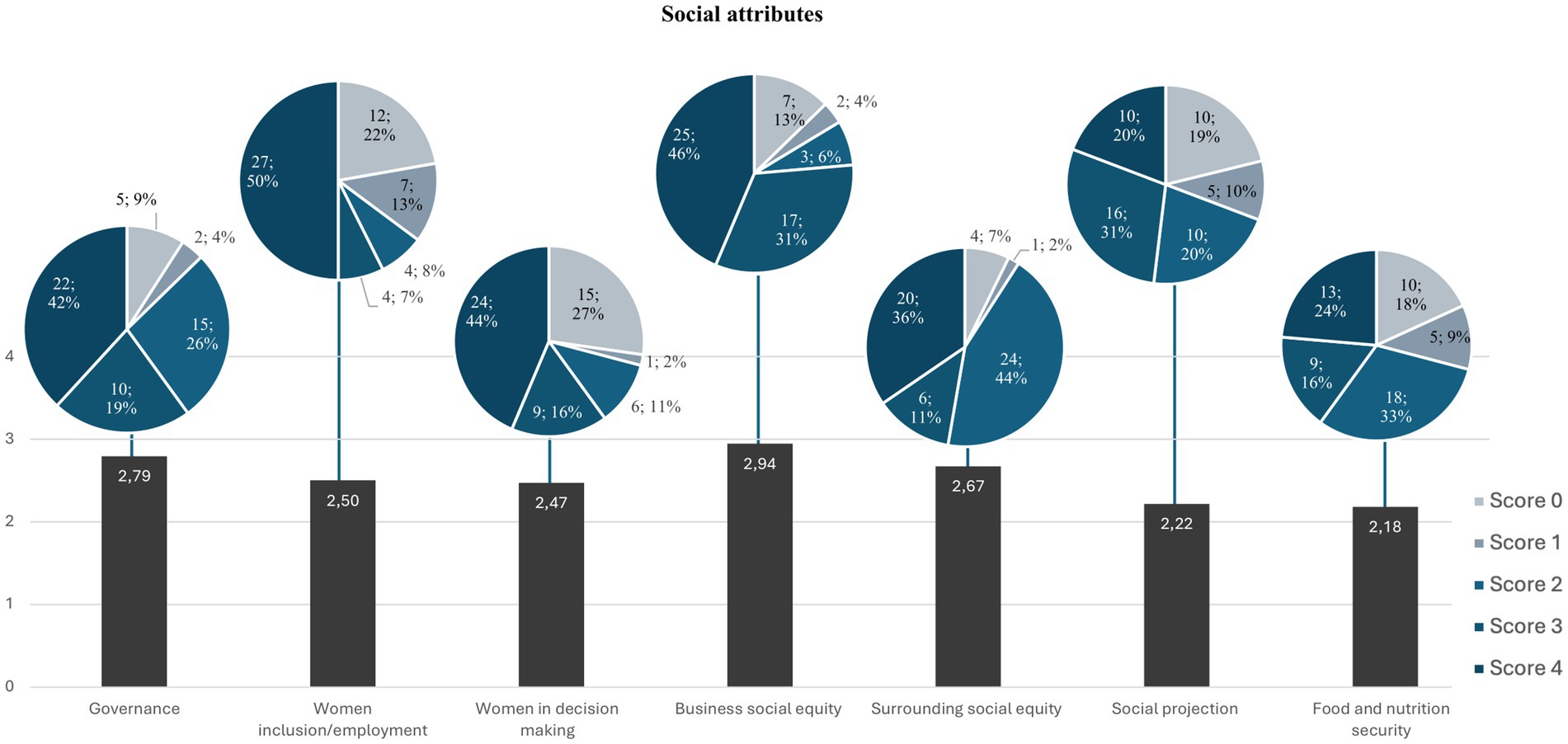
Figure 8. Average scores for each one of the Social attributes studied. The bar chart represents the average situation of the evaluated businesses for the assigned attribute. The pie chart represents the number of businesses according to the score they received. The score 0 represents the scenario furthest from the regenerative transition, while 4 represents the ideal regenerative scenario.
The high level of alignment of the ‘Governance’ attribute, with 32 cases scoring 3 or 4, is linked to the existence of dialogue spaces within the businesses that promote more inclusive decision-making processes. However, the interviews did not provide sufficient information on the depth or quality of participation in these dialogue spaces. Typically, assessing this level of depth requires direct visits or interviews with the individuals involved.
‘Business social equity’ oriented internal policies within the businesses were employed to a good extent by 76% (n = 42) of the interviewed cases. Among the most frequently mentioned practices (Figure 9) is the prioritization of local employees or of the most vulnerable social classes, fair distribution of economic benefits, and promotion of gender equity. Finally, it was noticeable that some cooperatives and associations in the Central American Corridor and elsewhere offer complementary services to their associates and communities (or incubate community groups to manage this) such as credit and seed banks.
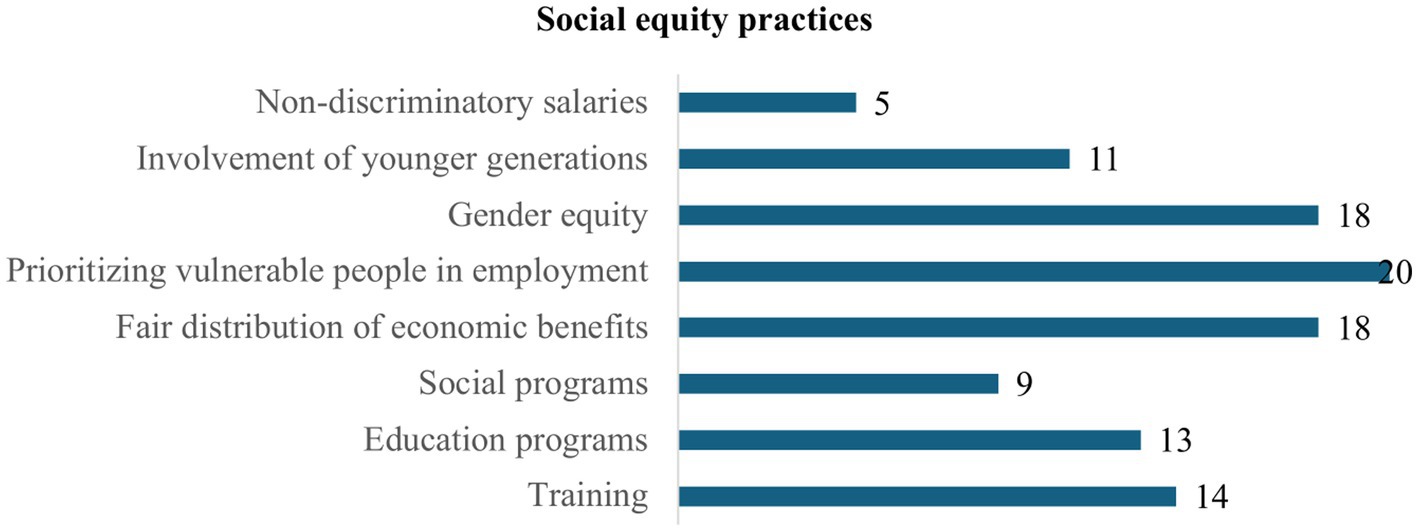
Figure 9. Practices related to the ‘Business social equity’ attribute, as identified in the interviewed businesses. The y-axis lists the actions to promote social equity in the business. The x-axis represents the number of businesses that reported engaging in each of these practices.
Regarding social dimension attributes with average scores below 2, several key observations emerge. Both ‘Surrounding Social Equity’ and ‘Social Projection’ attributes relate to how businesses engage with their territories and local communities and aim at assessing their efforts to “regenerate” and positively impact the social context. The interview results indicate that most businesses struggle to perform at higher levels in these realms due to challenges such as limited time, resources, and workforce. While 39 businesses reported participating in territorial management activities, only 19 reported being actively involved. Notably, the higher scores (3–4) were observed among community-operated businesses, such as associations and cooperatives, which are often founded with the goal of transforming their territories and addressing local needs.
Figure 10 illustrates some of the main social territory practices promoted by businesses. They include training programs for surrounding communities or associated suppliers, educational and social initiatives, and business incubation and development, in which businesses contribute to enhancing the quality of services or products offered by suppliers. In these contexts, communities benefiting from these initiatives have reportedly been able to establish small businesses, improve gender equity and women’s empowerment, enhance quality of life and income, and develop skills and knowledge in various areas such as good agricultural practices, raw material transformation, and environmental awareness.
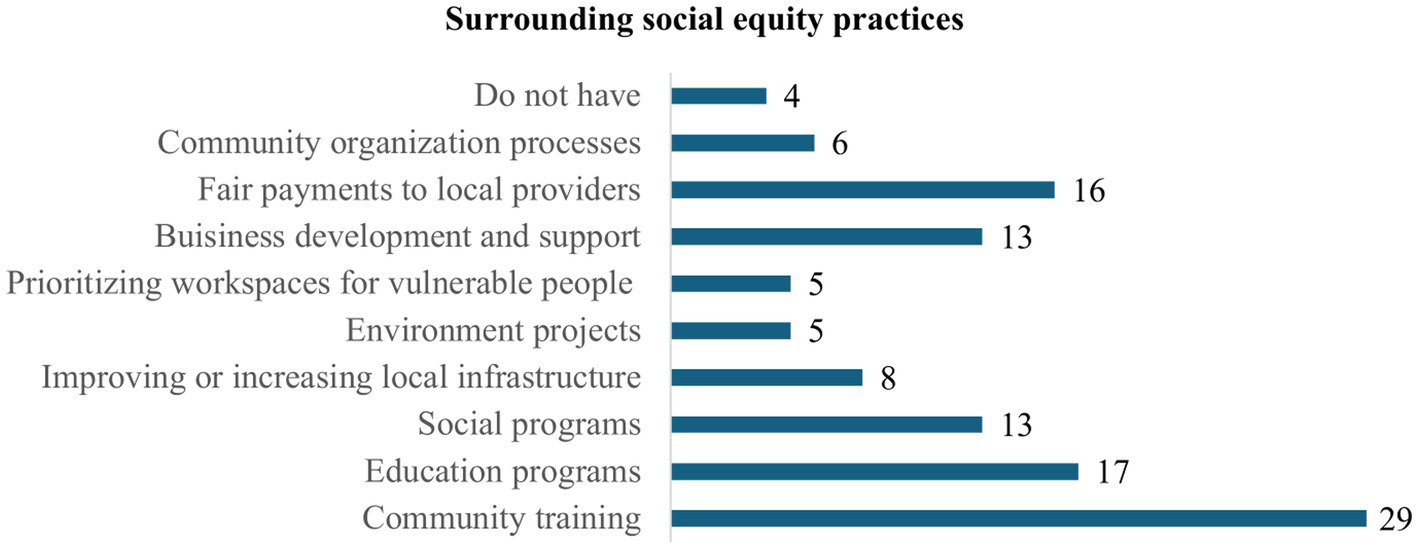
Figure 10. Practices related to the ‘Surrounding social equity’ attribute, as identified in the interviewed businesses. These practices are aimed at strengthening the territory or community where the business is located. The y-axis lists the actions to promote social equity surrounding to the businesses. The x-axis represents the number of businesses that reported engaging in each of these practices.
‘Food and nutrition security’ in the context analyzed has proven to be a topic rarely mentioned or discussed by businesses. Only 22 units achieved scores 3 or 4. Although all of them in some way contribute directly or indirectly to this topic, fewer businesses have it as a flagship of their business or present it as something highly relevant. Food and nutrition security too is usually addressed by associations and cooperatives, and to a lesser extent by small or medium-sized companies. Some of the practices designed to address this issue mentioned by businesses were: allocating a small percentage of profits for food security of the population in the territory; promoting home gardens among employees’ or suppliers’ families; nutrition education; incentives to a diversified agriculture; and promoting the use of species of cultural relevance.
3.6 Economical dimension and its gaps
Within the economic dimension, over 50% of surveyed cases achieved scores higher than 3 in the two attributes analyzed: 32 businesses in the ‘Profitability’ attribute and 41 in the ‘Value network articulation’ attribute. Figure 11 illustrates the percentage of cases within the different score ranges, along with the average score obtained by businesses in each attribute.
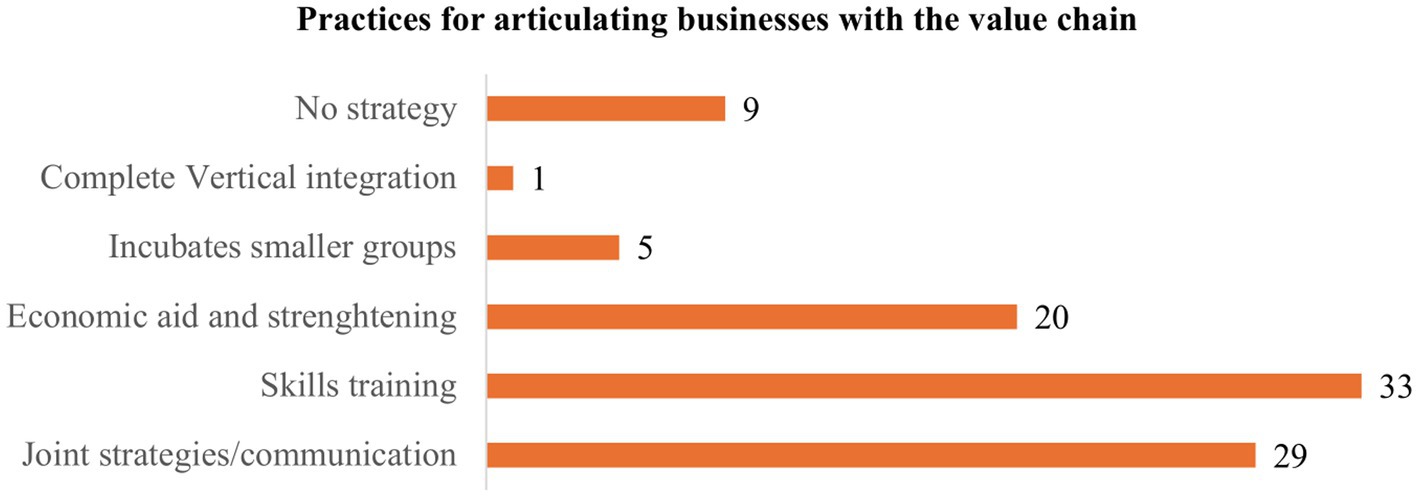
Figure 11. Average scores for each one of the Economic attributes studied. The bar chart represents the average situation of the evaluated businesses for the assigned attribute. The pie chart represents the number of businesses according to the score they received. The score 0 represents the scenario furthest from the regenerative transition, while 4 represents the ideal regenerative scenario.
Sixty-one percent of businesses earn profits regularly, while 26% experience inconsistent profitability due to market price fluctuations and production losses, many of which are caused by weather impacts, pests, and diseases. Thirteen percent of businesses do not yet earn profits but are nonetheless capable of covering operating costs and continuing production. Both small and large-scale businesses report that transitioning toward greener and socially just practices requires significant investment. This economic constraint forces businesses to concentrate their efforts and resources on a few key attributes, making it challenging to achieve a holistic impact, at least initially. This is particularly relevant for agricultural businesses. It must be stressed that the scores presented here reflect the interviewee’s perceptions, rather than a thorough analysis of the business’s financial records.
Regarding the ‘Articulation with the value chain/network’, the main practices employed by businesses include training suppliers, developing joint strategies and communication, and economically strengthening suppliers by paying ‘fair prices’ above the general market price (Figure 12). While the overall scenario of value network articulation among the businesses interviewed is positive, several bottlenecks were highlighted. One of the key challenges is ensuring that suppliers meet quality standards required by markets, particularly international ones. There are also difficulties in meeting product demanded levels. Additional constraints include lack of continuous access to commercialization channels and geographical remoteness of many businesses, which are often located far from consumer centers, as well as poor infrastructure such as roads. Furthermore, businesses still have to face consumers’ unwillingness to pay higher prices for “regenerative” or socio-environmentally fair products.
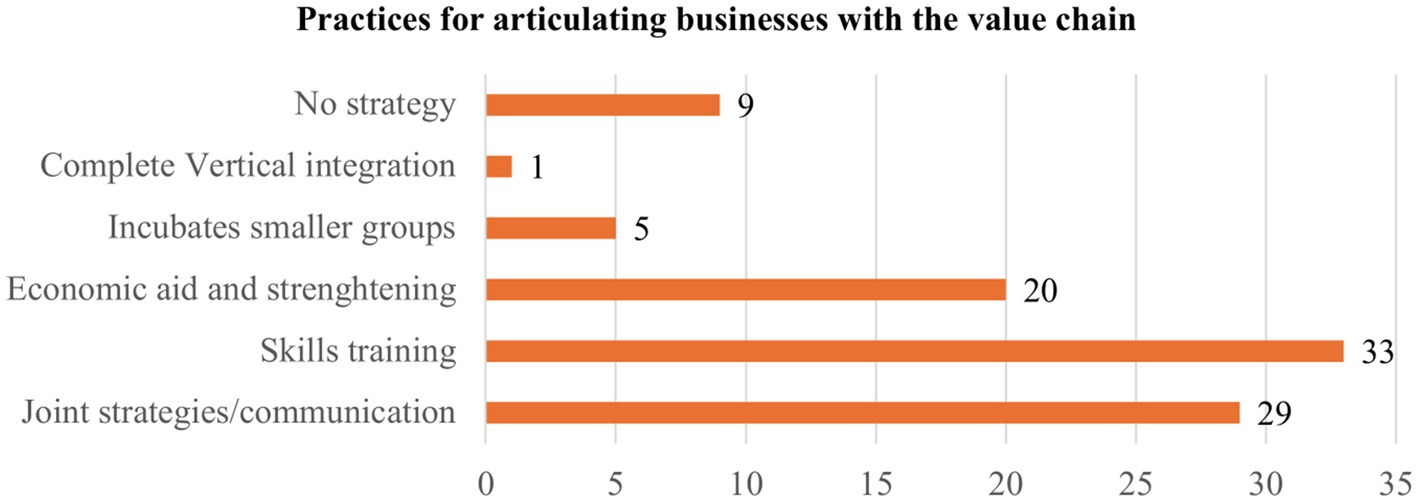
Figure 12. Practices related to the ‘articulation with the value chain’ attribute, as identified in the interviewed businesses. The y-axis lists the different ways in which a business aims to strengthen other links in the value chain. The x-axis represents the number of businesses that reported engaging in each of these practices.
3.7 Impact evidence
Only 23 cases (41%) reported having evidence (such as studies, reports, certifications, or other) supporting the positive impact of their businesses on the environment, followed by the economic impact they cause in the business context. Nine of these businesses reported having evidence of impacts across all three dimensions analyzed (environmental, social, and economic). However, even among those without concrete or measured evidence, most interviewees shared personal observations of their impacts, and mentioned informal detection of improvement of soil quality, biodiversity, and productivity, as well as direct or indirect benefits to local communities. Informally, some noted that practices such as paying suppliers higher than regular market prices had a positive impact on the quality of life for local families.
Some of the mentioned evidence was generated with the support of academic centers or external projects focused on data collection. However, for many businesses, producing evidence seems not to be a priority; the reasons for that often mentioned being the high cost of data collection and the lack of systematization capabilities within their teams. In several cases, gathering evidence required obtaining certifications, which can be costly and often out of reach for businesses pursuing a regenerative approach. These businesses are already grappling with the costs inherent to transitioning to regenerative practices, as well as with a series of barriers such as limited access to inputs, technologies, and markets (Starobin, 2021; Meemken, 2021).
3.8 Tool applicability
There are currently numerous tools available that contribute to the ‘verification’ of regeneration quality at both farm level and larger-scale businesses, spanning the environmental, social, and economic dimensions (Jayasinghe et al., 2023). While many of them were not specifically designed with the regenerative approach in mind, they share the practices and principles that help generate vital evidence to strengthen the regenerative business ecosystem.
IPRA (Initial Potential for Regenerative Agriculture) has similarities with other tools, like FAO’s SAFA (Sustainability Assessment of Food and Agriculture) (de Oliveira et al., 2023) and TAPE (Tool for Agroecology Performance Evaluation) by Mottet et al. (2020), especially in the types of attributes assessed, ranking methodology, and the type of results produced. However, TAPE is a more complex tool that goes beyond interviews, incorporating, for example, field-based stages involving stakeholder validation, and requiring a greater time commitment and resources for its full implementation.
Verifying the level of regeneration within businesses across multiple dimensions can be both costly and time-consuming (Florman et al., 2016; Soto et al., 2020; Brummitt et al., 2024). This poses a significant challenge for organizations, investors, and other institutions aiming to support the transition of food systems toward a regenerative approach yet lacking the time or resources to conduct field visits within a reasonable timeframe. Stakeholders seeking to drive this transition require at least some form of evidence to rapidly guide their efforts, directing them toward businesses with potential to adopt and promote this approach.
IPRA addresses this early-stage gap by helping answer the question: Which businesses should I look into further, or which ones show the most potential to withstand a successful transition? Each working objective calls for its own ideal methodology or tool, depending on the time and resources available to those conducting the assessment. IPRA does not aim to replace more detailed tools, but rather to serve as a complementary step. For example, it can be used prior to more in-depth evaluations such as Step 2 of the FAO’s TAPE tool, which involves detailed analysis of soil health, biodiversity, or productivity outcomes, among other methodologies.
The key distinguishing feature of IPRA lies in its ability to gather relevant and nuanced information on each attribute of the regenerative approach through a single interview, without requiring fieldwork. This is achieved by combining open and closed-ended questions, the responses of which help classify businesses according to their level of maturity in terms of regenerative approach. At the same time, the tool captures discursive particularities that inform decision-making according to the specific goals of the researcher or evaluator. Thus, the tool offers a rapid yet insightful means of guiding decisions based not only on rankings but also on the qualities and subjectivities underlying the scores.
IPRA tool is widely accessible, as it does not involve significant implementation costs, the main expense being the time of a person conducting the interview and analyzing the information. Its use has made it possible to gain an overview of the characteristics of the businesses assessed in the survey presented herewith and has served as a guide for selecting which ones to visit and study more thoroughly on the ground. The tool has proven adaptable to different business models and scales, with interview protocols designed to foster understanding and dialogue across diverse audiences. It has also been successfully applied to remote businesses in the Amazon. With proper planning and time management, effective virtual communication was established with these enterprises using platforms such as Google Meet, Zoom, and WhatsApp calls.
In Latin America, businesses connected to the food system feature diverse types of products, services, and value chains in which they operate. While many are primarily associated with agricultural and/or livestock systems, there is also a significant number of enterprises dedicated exclusively to the sustainable use of non-timber forest products (NTFPs), or that integrate NTFPs as part of their economic strategy in the conservation areas of farms. Alongside the diversity of products that can come from these regions, there is also a wide range of identity-based populations that have historically used these resources and who lead business models aligned with the conservation of their territories and cultural heritage.
The IPRA tool is designed to recognize and highlight key particularities of this multicultural Latin American context, especially within large and complex biomes such as the Amazon. Its databases capture the diverse range of options present in the studied contexts, as well as the underlying narratives that give meaning to this diversity. Although IPRA was developed within the Latin American context, it can be adapted, both within the region and in other global settings, by adding or removing information, depending on the specific objectives of the survey to be carried out.
In the Amazon and Central America dry corridor survey, the tool also made it possible to assess the consistency of the narratives presented by the businesses by examining both the quantitative and qualitative data gathered through interviews. Its effective application has provided insights into the overall set of attributes, helping to identify key flaws and strength areas within businesses and explore the underlying causes of certain results. The dataset, which includes a progress score (ranging from 0 to 4) for each attribute, has turned out to be a foundation for discussions and the selection of businesses of interest for researching by the RFB Consortium. Therefore, the IPRA’s applicability is deemed viable across various contexts of food businesses, different scales, levels of isolation, languages, and budget constraints.
4 Main limitations and recommendations
a. The tool is not capable of guaranteeing that the highest-ranked businesses provide concrete evidence of positive outcomes or that they are genuinely committed to the actions they report. This is particularly important given that the data are primarily based on self-reported information provided by business representatives during the interviews. Therefore, IPRA should not be considered a definitive tool for verifying the level or quality of regeneration within a business, as in audit or certification processes. To this end, it is essential to apply additional instruments that allow for in situ evaluation of the regenerative approach following the prior IPRA assessment.
b. The quality of the data collected depends significantly on the interviewer’s skills and prior knowledge. A critical analysis of the narratives gathered before and during the interviews is essential for discerning the business’s underlying intentions.
c. Although the Attribute Evaluation Reference Matrix outlines scoring criteria from “0” to “4” for each attribute, and in some cases provides thresholds, the evaluation process may still involve a degree of subjectivity. To minimize high levels of subjectivity, cross-evaluation between two interviewers is essential. For this purpose, it is important to ensure that interviews are transcribed or recorded, allowing for other stakeholders the opportunity to review and discuss the findings.
d. Conclusions about an individual business, or about the broader overview of businesses evaluated, should not be based solely on the scores from the Attribute Assessment Reference Matrix. It is also essential to incorporate a qualitative analysis of the narratives and contextual information gathered through other IPRA instruments, which provide critical insights that enrich and support the interpretation of the scores.
e. If the goal is to filter or select businesses based on the use of this tool, it is recommended that the analysis of results be discussed thoroughly with the entities requesting the study. While the tool allows for the application of inferential statistical models to support the selection process, this is not the most advisable approach for this tool, as it does not delve deeply into the narratives and underlying reasoning behind each response.
5 Conclusion
IPRA proved to be an effective tool to provide a preliminary perception of the adoption of regenerative alignment of food businesses in our survey. The results obtained from it revealed the alignment of the 55 businesses across various regenerative approach attributes. The practices and principles identified were highly aligned with findings from other studies on regenerative approach, particularly within the environmental dimension. Businesses demonstrated significant commitment, especially in areas such as soil conservation, avoiding synthetic inputs, promoting waste circularity, and addressing social inequalities within their operations. These findings indicate that such business models hold substantial potential for positively impacting food systems. Nevertheless the interviews also underscored economic challenges, notably the struggle to achieve financial sustainability that allows for reinvestment, and which, in turn, affects progress in other dimensions.
Its efficacy relies on a comprehensive analysis of both quantitative and qualitative data so as to get a close understanding of the interviewee’s discourse and the reasons behind the practices or principles taken by the business. Through its application in different contexts and sectors of the Amazon and the Central American Dry Corridor, the tool has provided an enriched overview of the particularities associated with these geographic areas. For example, it has revealed challenges related to the isolation of businesses in the Amazon, the broad use of the “regenerative” term in the Dry Corridor, and the diverse productive approaches found across the regions. This, in turn, has laid a reliable foundation for selecting businesses and conducting further analyses during RFB project.
While IPRA may suffice for certain types of studies and analyses, it must be stressed that verifying whether a business is truly and meaningfully applying a regenerative approach requires in situ visits to understand the initiative firsthand. It also involves using complementary tools to assess the different dimensions of the business in the field. For this reason, the IPRA is recommended as a guiding tool for the preliminary selection of businesses in research and model identification processes, whether by academic institutions, government or non-governmental organizations, investors, or other stakeholders.
Once IPRA has been applied, the next step is to jointly review the results with stakeholders and interviewers to identify the businesses with the greatest potential. After selecting the most promising cases, it is recommended to use complementary tools alongside IPRA to conduct a deeper field-based analysis of the pre-assessed attributes and ultimately determine the extent of the business’s commitment to regenerative practices.
Likewise, the widespread application of the tool across different territories in Latin America could provide a quick overview of how the regenerative approach is being implemented by businesses, highlighting both the positive aspects of their progress and the gaps that persist, depending on the bioregion they operate in or the social context they are connected to. This rapid overview, offered by IPRA, can in itself play a key role in supporting the urgent development of public policy frameworks and other actions aimed at strengthening and advancing the regenerative approach throughout Latin America.
Data availability statement
The data analyzed in this study is subject to the following licenses/ restrictions: to prevent the misuse of data from the interviewed businesses, the information will be made available through direct contact with the authors. Requests to access these datasets should be directed to BA, bmFyZWdlbmVyYXRpdm9AZ21haWwuY29t.
Author contributions
BA: Conceptualization, Data curation, Formal analysis, Investigation, Methodology, Supervision, Validation, Visualization, Writing – original draft, Writing – review & editing. MY: Conceptualization, Investigation, Methodology, Project administration, Supervision, Visualization, Writing – original draft, Writing – review & editing. DB: Data curation, Formal analysis, Investigation, Validation, Writing – review & editing. GD: Project administration, Writing – review & editing. PV: Project administration, Writing – review & editing.
Funding
The author(s) declare that financial support was received for the research and/or publication of this article. International Development Research Center of Canada (IDRC) funded the project “Regenerative agribusiness and investment with a gender lens in the Amazonia and Central America dry corridor” - project ID 109788 - in entirety.
Acknowledgments
The authors would like to thank, first and foremost, the 55 businesses that provided information for this study and demonstrated full openness throughout the process. Secondly, the authors gratefully acknowledge IDRC for its commitment to promoting the transition of food systems by funding this project and the AVINA Foundation for its leadership in the project and support for the research conducted. Furthermore, we extend our gratitude to the entire RFB Consortium, with special appreciation to Santiago Mazzeo, Gastón Kremer, Tomás de Lara, Laura Ortiz, Antonio de La Rosa, Cairo Bastos, Renata Truzzi, Nicole Etchart, Carolina Robino, Sandra Gagnon, Diana Trujillo, Manuel Glave, Ricardo Fort, Rodrigo Salcedo, and Pedro Pineda, for their active participation in validating the application of this tool and their valuable contributions of knowledge to this effort. We extend our gratitude to Rosmaiky Guzmán and Claudia Rojas for their essential support in conducting interviews, ensuring analysis quality, and identifying businesses. We also thank Victor H. Bonilla-Muñoz from URL/IARNA for assisting with the final interviews and contributing associated information. We also acknowledge NESsT for providing key information on some of the Amazonian businesses. Lastly, the authors acknowledge the use of OpenAI’s ChatGPT (version 4.0) as an initial translation tool for this article from Spanish to English, followed by a thorough secondary review process conducted by Marcelo Mansur Levy, to whom we extend special thanks for his support.
Conflict of interest
The authors declare that the research was conducted in the absence of any commercial or financial relationships that could be construed as a potential conflict of interest.
Generative AI statement
The authors declare that Gen AI was used in the creation of this manuscript. The authors use of OpenAI’s ChatGPT (version 4.0) as an initial translation tool for this article from Spanish to English, followed by a secondary review process.
Publisher’s note
All claims expressed in this article are solely those of the authors and do not necessarily represent those of their affiliated organizations, or those of the publisher, the editors and the reviewers. Any product that may be evaluated in this article, or claim that may be made by its manufacturer, is not guaranteed or endorsed by the publisher.
Supplementary material
The Supplementary material for this article can be found online at: https://www.frontiersin.org/articles/10.3389/fsufs.2025.1546496/full#supplementary-material
Footnotes
1. ^To explore the mapping results and the associated criteria, access the publication: https://doi.org/10.3389/fsufs.2025.1546626.
2. ^The RFB Consortium was stablished within the framework of the Project Regenerative Food Businesses and investment with a gender lens: regeneration for a better reconstruction of the Amazon and the Central American Dry Corridor of Latin America and the Caribbean, funded by IDRC Canada and coordinated by AVINA Foundation. Members of the Consortium: IDRC, AVINA Foundation, WTT, CATIE, Sistema B, NESsT, SVX-Mx, SEKN, GRADE, URL. More info: www.regenerativo.org.
3. ^Latin American HUB of Regenerative Food Businesses: www.regenerativo.org.
References
Batlles-delaFuente, A., Abad-Segura, E., González-Zamar, M. D., and Cortés-García, F. J. (2022). An evolutionary approach on the framework of circular economy applied to agriculture. Agronomy 12:620. doi: 10.3390/agronomy12030620
El Bilali, H., Callenius, C., Strassner, C., and Probst, L. (2019). Food and nutrition security and sustainability transitions in food systems. Food Energy Secur. 8:e00154. doi: 10.1002/fes3.154
Billiet, A., Dufays, F., Friedel, S., and Staessens, M. (2021). The resilience of the cooperative model: how do cooperatives deal with the COVID-19 crisis? Strateg. Change. 99:108. doi: 10.1002/jsc.2393
Boucher, M., Mohankumar, S., and Montosa, M. (2023). The four labours of regenerative agriculture: paving the way towards meaningful commitments. England and Wales: FAIRR Initiative.
Brummitt, C. D., Mathers, C. A., Keating, R. A., O'Leary, K., Easter, M., Friedl, M. A., et al. (2024). Solutions and insights for agricultural monitoring, reporting, and verification (MRV) from three consecutive issuances of soil carbon credits. J. Environ. Manag. 369:122284. doi: 10.1016/j.jenvman.2024.122284
Buckton, S. J., Fazey, I., Sharpe, B., Om, E. S., Doherty, B., Ball, P., et al. (2023). The regenerative lens: a conceptual framework for regenerative social-ecological systems. One Earth 6, 824–842. doi: 10.1016/j.oneear.2023.06.006
Clark, M. A., Domingo, N. G. G., Colgan, K., Thakrar, S. K., Tilman, D., Lynch, J., et al. (2020). Global food system emissions could preclude achieving the 1.5 and 2 C climate change targets. Science 370, 705–708. doi: 10.1126/science.aba7357
Crippa, M., Solazzo, E., Guizzardi, D., Monforti-Ferrario, F., Tubiello, F. N., and Leip, A. (2021). Food systems are responsible for a third of global anthropogenic GHG emissions. Nat. Food 2, 198–209. doi: 10.1038/s43016-021-00225-9
de Oliveira, J., Hanisch, A. L., and Farias, D. R. (2023). SAFA FAO as an assessment tool for family farming under the sustainability bias. Sustain. Debate 14:216. doi: 10.18472/SustDeb.v14n1.2023.47089
Dudensing, R. (2023). “Role of value-added agriculture in promoting regenerative processes within a circular economy” in Sustainable agricultural practices and product design. eds. A. Norton, D. Scheff, and L. M. Gilbertson (ACS Publications), 1–10. doi: 10.1021/bk-2023-1449.ch001
Duncan, J., Carolan, M., and Wiskerke, J. S. (2020). “Regenerating food systems: a social-ecological approach” in Routledge Handb. Sust. Regener. Food Syst. (Routledge), 1–11. Available at: https://www.taylorfrancis.com/chapters/edit/10.4324/9780429466823-1/regenerating-food-systems-jessica-duncan-michael-carolan-johannes-wiskerke
Elrick, W., Luke, H., and Stimpson, K. (2022). Exploring opportunities and constraints of a certification scheme for regenerative agricultural practice. Agroecol. Sustain. Food Syst. 46, 1527–1549. doi: 10.1080/21683565.2022.2121950
Florman, M., Klingler-Vidra, R., and Facada, M. J. (2016). A critical evaluation of social impact assessment methodologies and a call to measure economic and social impact holistically through the external rate of return platform. LSE Enterprise 1:32. Available at: https://kclpure.kcl.ac.uk/portal/en/publications/a-critical-evaluation-of-socialimpact-assessment-methodologies-a
Fróna, D., Szenderák, J., and Harangi-Rákos, M. (2021). Economic effects of climate change on global agricultural production. Nat. Conserv. 44, 117–139. doi: 10.3897/natureconservation.44.64296
Gabric, A. J. (2023). The climate change crisis: a review of its causes and possible responses. Atmosphere 14:1081. doi: 10.3390/atmos14071081
Giller, K. E., Hijbeek, R., Andersson, J. A., and Sumberg, J. (2021). Regenerative agriculture: an agronomic perspective. Outlook Agric. 50, 13–25. doi: 10.1177/0030727021998063
Gordon, E., Davila, F., and Riedy, C. (2023). Regenerative agriculture: a potentially transformative storyline shared by nine discourses. Sustain. Sci. 18, 1833–1849. doi: 10.1007/s11625-022-01281-1
Gosnell, H., Grimm, K., and Goldstein, B. E. (2020). A half century of holistic management: what does the evidence reveal? Agric. Hum. Values 37, 849–867. doi: 10.1007/s10460-020-10016-w
Hirvilammi, T., and Koch, M. (2020). Sustainable welfare beyond growth. Sustain. For. 12:1824. doi: 10.3390/su12051824
Huang, Y., Ren, W., Wang, L., Hui, D., Grove, J. H., Yang, X., et al. (2018). Greenhouse gas emissions and crop yield in no-tillage systems: a meta-analysis. Agric. Ecosyst. Environ. 268, 144–153. doi: 10.1016/j.agee.2018.09.002
IPCC (2023). “Summary for policymakers” in Climate change 2023: synthesis report. Contribution of working groups I, II and III to the sixth assessment report of the intergovernmental panel on climate change. eds. H. Lee and J. Romero (Geneva, Switzerland: IPCC), 1–34.
Jayasinghe, S. L., Thomas, D. T., Anderson, J. P., Chen, C., and Macdonald, B. C. T. (2023). Global application of regenerative agriculture: a review of definitions and assessment approaches. Sustain. For. 15:15941. doi: 10.3390/su152215941
Kaplan, D. M. (2017). “Narratives of food, agriculture, and the environment” in The Oxford handbook of environmental ethics. eds. S. M. Gardiner and A. Thompson (Oxford University Press). Available at: https://academic.oup.com/edited-volume/28377/chapterabstract/215281152?redirectedFrom=fulltext
Khangura, R., Ferris, D., Wagg, C., and Bowyer, J. (2023). Regenerative agriculture - a literature review on the practices and mechanisms used to improve soil health. Sustain. For. 15:2338. doi: 10.3390/su15032338
Konietzko, J., Das, A., and Bocken, N. (2023). Towards regenerative business models: a necessary shift? Sustain. Prod. Consumpt. 38, 372–388. doi: 10.1016/j.spc.2023.04.014
LaCanne, C. E., and Lundgren, J. G. (2018). Regenerative agriculture: merging farming and natural resource conservation profitably. PeerJ 6:e4428. doi: 10.7717/peerj.4428
Lal, R. (2020). Regenerative agriculture for food and climate. J. Soil Water Conserv. 75:124A. doi: 10.2489/jswc.2020.0620A
Loring, P. A. (2022). Regenerative food systems and the conservation of change. Agric. Hum. Values 39, 701–713. doi: 10.1007/s10460-021-10282-2
Mbow, C., Rosenzweig, C., Barioni, L. G., Benton, T. G., Herrero, M., and Krishnapillai, M. (2019). “Food security” in Climate change land: an IPCC special report on climate change, desertification, land degredation, sustainable land management, food security, greenhouse gas fluxes in terrestrial ecosystems. eds. P. R. Shukla, J. Skea, E. C. Buendia, V. Masson-Delmotte, H.-O. Pörtner, and D. C. Roberts (IPCC). Available at: https://www.ipcc.ch/srccl/chapter/chapter-5/
Meemken, E. M. (2021). Large farms, large benefits? Sustainability certification among family farms and agro-industrial producers in Peru. World Dev. 145:105520. doi: 10.1016/j.worlddev.2021.105520
Montgomery, D. R., Biklé, A., Archuleta, R., Brown, P., and Jordan, J. (2022). Soil health and nutrient density: preliminary comparison of regenerative and conventional farming. PeerJ 10:e12848. doi: 10.7717/peerj.12848
Morseletto, P. (2020). Restorative and regenerative: exploring the concepts in the circular economy. J. Ind. Ecol. 24, 763–773. doi: 10.1111/jiec.12987
Mottet, A., Bicksler, A., Lucantoni, D., De Rosa, F., Scherf, B., Scopel, E., et al. (2020). Assessing transitions to sustainable agricultural and food systems: a tool for agroecology performance evaluation (TAPE). Front. Sustain. Food Syst. 4:579154. doi: 10.3389/fsufs.2020.579154
Nabuurs, G. J., Mrabet, R., Hatab, A. A., Bustamante, M., Clark, H., Havlík, P., et al. (2023). “Agriculture, forestry and other land uses (AFOLU)” in Climate change 2022: mitigation of climate change (Cambridge University Press), 747–860. Available at: https://www.ipcc.ch/report/ar6/wg3/chapter/chapter-7/
NAR. (2023). Available online at: https://regenerativo.org/espacio-de-aprendizaje/ (Accessed August 07, 2024).
Newman-Beckett, E. (2023). Aligning regenerative agricultural practices with outcomes to deliver for people, nature and climate. United States of America: The Food and Land Use Coalition.
Newton, P., Civita, N., Frankel-Goldwater, L., Bartel, K., and Johns, C. (2020). What is regenerative agriculture? A review of scholar and practitioner definitions based on processes and outcomes. Front. Sustain. Food Syst. 4:577723. doi: 10.3389/fsufs.2020.577723
Niles, M. T., Ahuja, R., Barker, T., Esquivel, J., Gutterman, S., Heller, M. C., et al. (2018). Climate change mitigation beyond agriculture: a review of food system opportunities and implications. Renew. Agric. Food Syst. 33, 297–308. doi: 10.1017/S1742170518000029
Prochazka, P., Abrham, J., Cerveny, J., Kobera, L., Sanova, P., Benes, D., et al. (2023). Understanding the socio-economic causes of deforestation: a global perspective. Front. For. Glob. Change 6:1288365. doi: 10.3389/ffgc.2023.1288365
Rhodes, C. J. (2017). The imperative for regenerative agriculture. Sci. Prog. 100, 80–129. doi: 10.3184/003685017X14876775256165
Sands, B., Machado, M. R., White, A., Zent, E., and Gould, R. (2023). Moving towards an anti-colonial definition for regenerative agriculture. Agric. Hum. Values 40, 1697–1716. doi: 10.1007/s10460-023-10429-3
Schreefel, L., Schulte, R. P., de, I. J. M., Schrijver, A. P., and van, H. H. E. (2020). Regenerative agriculture–the soil is the base. Glob. Food Secur. 26:100404. doi: 10.1016/j.gfs.2020.100404
Schulte, L. A., Dale, B. E., Bozzetto, S., Liebman, M., Souza, G. M., Haddad, N., et al. (2022). Meeting global challenges with regenerative agriculture producing food and energy. Nat. Sustain. 5, 384–388. doi: 10.1038/s41893-021-00827-y
Scialabba, N. E. H. (2022). “Livestock as a tool to regenerate land” in Managing healthy livestock production and consumption. ed. N. E. H. Scialabba (Academic Press), 155–162. Available at: https://www.sciencedirect.com/science/article/abs/pii/B9780128230190000052
Seymour, M., and Connelly, S. (2023). Regenerative agriculture and a more-than-human ethic of care: a relational approach to understanding transformation. Agric. Hum. Values 40, 231–244. doi: 10.1007/s10460-022-10350-1
Sherren, K., and Kent, C. (2019). Who's afraid of Allan savory? Scientometric polarization on holistic management as competing understandings. Renew. Agric. Food Syst. 34, 77–92. doi: 10.1017/S1742170517000308
Soto, R. L., Padilla, M. C., and de Vente, J. (2020). Participatory selection of soil quality indicators for monitoring the impacts of regenerative agriculture on ecosystem services. Ecosyst. Serv. 45:101157. doi: 10.1016/j.ecoser.2020.101157
Starobin, S. M. (2021). Credibility beyond compliance: uncertified smallholders in sustainable food systems. Ecol. Econ. 180:106767. doi: 10.1016/j.ecolecon.2020.106767
Thompson, B., Leduc, G., Manevska-Tasevska, G., Toma, L., and Hansson, H. (2024). Farmers' adoption of ecological practices: a systematic literature map. J. Agric. Econ. 75, 84–107. doi: 10.1111/1477-9552.12545
Tittonell, P., El Mujtar, V., Felix, G., Kebede, Y., Laborda, L., Luján Soto, R., et al. (2022). Regenerative agriculture—agroecology without politics? Front. Sustain. Food Syst. 6:844261. doi: 10.3389/fsufs.2022.844261
Tittonell, P., Piñeiro, G., Garibaldi, L. A., Dogliotti, S., Olff, H., and Jobbagy, E. G. (2020). Agroecology in large scale farming - a research agenda. Front. Sustain. Food Syst. 4:584605. doi: 10.3389/fsufs.2020.584605
Vargas, C., Gomez-Valencia, M., Gonzalez-Perez, M. A., Cordova, M., Casnici, C. V. C., Monje-Cueto, F., et al. (2022). Climate-resilient and regenerative futures for Latin America and the Caribbean. Futures 142:103014. doi: 10.1016/j.futures.2022.103014
Velasco-Muñoz, J. F., Mendoza, J. M. F., Aznar-Sánchez, J. A., and Gallego-Schmid, A. (2021). Circular economy implementation in the agricultural sector: definition, strategies and indicators. Resour. Conserv. Recycl. 170:105618. doi: 10.1016/j.resconrec.2021.105618
Webb, P., Benton, T. G., Beddington, J., Flynn, D., Kelly, N. M., and Thomas, S. M. (2020). The urgency of food system transformation is now irrefutable. Nat. Food 1, 584–585. doi: 10.1038/s43016-020-00161-0
Keywords: regenerative food business, sustainable business models, regenerative agriculture, sustainable food systems, regenerative transition, regenerative tools
Citation: Amante BL, Yamauchi Levy M, Borrero D, Detlefsen G and Vagliente P (2025) A practical tool to assess regenerative approaches in food businesses. Front. Sustain. Food Syst. 9:1546496. doi: 10.3389/fsufs.2025.1546496
Edited by:
Srdjan Šeremešić, University of Novi Sad, SerbiaReviewed by:
Coline C. Jaworski, Institut National de recherche pour l’agriculture, l’alimentation et l’environnement (INRAE), FranceVivek Manyapu, National Pingtung University of Science and Technology, Taiwan
Vladan Ugrenović, Institute for Soil Science, Serbia
Copyright © 2025 Amante, Yamauchi Levy, Borrero, Detlefsen and Vagliente. This is an open-access article distributed under the terms of the Creative Commons Attribution License (CC BY). The use, distribution or reproduction in other forums is permitted, provided the original author(s) and the copyright owner(s) are credited and that the original publication in this journal is cited, in accordance with accepted academic practice. No use, distribution or reproduction is permitted which does not comply with these terms.
*Correspondence: Bruna L. Amante, YnJ1bmEuYW1hbnRlQGNhdGllLmFjLmNy
†Present ADDRESSES: Max Yamauchi Levy, Ecoagriculture Partners, Oakton, VA, United States
Guillermo Detlefsen, Department of Technical Training and Forestry Education, National Forest Institute, Guatemala City, Guatemala
 Bruna L. Amante
Bruna L. Amante Max Yamauchi Levy
Max Yamauchi Levy Daniel Borrero
Daniel Borrero Guillermo Detlefsen1†
Guillermo Detlefsen1† Pablo Vagliente
Pablo Vagliente